 10/12/2009 05:59 10/12/2009 05:59 |
|
| | | OFFLINE | | Post: 19.047
Post: 1.694 | Registrato il: 28/08/2005
Registrato il: 20/01/2009 | Administratore | Utente Veteran | |
|

 Earlier entries for 12/9/09 are on the preceding page, including full program for Portugal visit,
Earlier entries for 12/9/09 are on the preceding page, including full program for Portugal visit,
as released by the Portuguese bishops Monday.

 Some positive feedback from China on
Some positive feedback from China on
recent follow-up to Pope's letter

Beijing, Dec. 9 (Agenzia Fides) – The 11/10/09 Letter from Vatican Secretary of State Cardinal Tarcisio Bertone to Chinese priests on the occasion of the Year for Priests (see Fides 16/11/2009), has received strong positive feedback from Chinese priests and faithful.
Nearly a month since the Letter's publication, Fides has received a letter written by a group of Chinese Bishops and priests who, following a careful study of the Letter from Cardinal Bertone, at the light of the Holy Father's Letter to Chinese Catholics (of 2007), communicate their own impressions and hopes.
“Cardinal Bertone’s letter does not criticize or speak about the endless arguments of the past and today’s new conflicts. He does not even mention some specific incidents that happened recently,” reads the text that notes how instead, Cardinal Bertone addresses Chinese priests “with a fatherly heart,” exhorting them with affection to place Saint John Mary Vianney as their example, as “priests in China are warmly encouraged and highly inspired by the exhortation of this high official of the Holy See and by his hope-giving invitation.”
Both this letter and the previous letter addressed by Pope Benedict XVI “confirm the deep concern for the Catholic Church in China and the understanding and love for Chinese priests shown by the Pope, the Secretary of the State and other high officials of the Holy See.”
The text says: “Chinese priests are very grateful to the Pope and the Secretary of State for their love and concern and agree with them on the points which they stress in their exhortation: to cultivate priestly virtues, to foster the maturation of their human formation, and to better establish church communities.”
It adads that in addressing the “new phenomena and new problems that have emerged in today’s Chinese Catholic Church,” the Letter from Cardinal Bertone “with its bright hope” indicates “clear direction,” placing itself “in line with the spirituality and theological thoughts of the popes.
It re-emphasises the principle and direction of dialogue and reconciliation according to current circumstances and the evolution of Sino-Vatican relations.”
The text sent to Fides also explains that, following the publication of the Letter from Pope Benedict XVI in 2007, “the disturbing persistent atmosphere of confrontation and tension has been alleviated to some extent and an atmosphere of reconciliation has gradually been created.”
Although “it will still take some time to reach entire reunion and communion before Sino-Vatican relations are normalized,” the path of dialogue, cooperation, and reconciliation has now been opened.
On this long path of reconciliation, surely “new problems and conflicts” will emerge, however they should not be overrated, just as the opinions of individuals cannot be used to represent the majority of the Church in China.
The priests also explain that “Cardinal Bertone understands very well the social situation in which the Chinese Church exists and her own persisting problems,” and thus does not ask Chinese priests to continue arguing over “who is correct and who is wrong,” instead he draws attention to “the highest of priests, Jesus Christ, and to the model of priests St. Vianney.”
The text concludes by recalling that “although it will still take some time to normalize the Sino-Vatican relations and although progress will probably be very difficult, one cannot deny the fact that Sino-Vatican relations have entered into a period of transition. Consequently, we the Chinese priests have to get ready for this and gradually build up our own awareness of the time that will follow upon the normalization of Sino-Vatican relations.
The full text of the letter in English translation can be found on
www.fides.org/eng/documents/Lett_rifl_ingl_05122009.doc
The obvious problem with this report is that it does not even state the number of signatories - how many bishops and how many priests, so one cannot judge how representative it is.
Obivously, it comes from those who do not agree with Cardinal Zen's more combative position, but how large a group are they?
[Modificato da TERESA BENEDETTA 11/12/2009 18:54] |
| |
|
| |
 10/12/2009 14:25 10/12/2009 14:25 |
|
| | | OFFLINE | | Post: 19.048
Post: 1.695 | Registrato il: 28/08/2005
Registrato il: 20/01/2009 | Administratore | Utente Veteran | |
|
 Thursday, Dec. 10
Thursday, Dec. 10
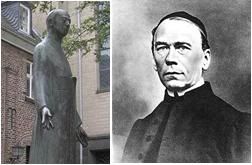 BLESSED ADOLPH KOLPING (Germany, 1813-1865)
BLESSED ADOLPH KOLPING (Germany, 1813-1865)
'Father of all apprentices'
Son of a peasant, he was a shoemaker before becoming a priest.
In Cologne, he set up the first workmen's society that promoted
the value of family life and the dignity of labor. His apostolate
with laborers was similar to John Bosco's with the urban young.
By the time he died, there were >400 Kolpingfamilien societies
in Germany. Today there are Kolpingwerk societies in 54 countries
of the world. He is buried in Cologne Cathedral and beatified in 1991.
OR for 12/9-12/10:
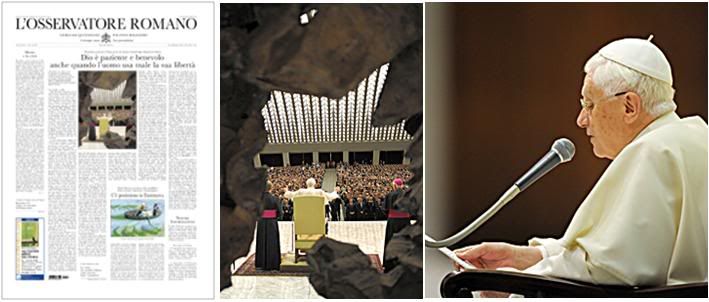
At the General Audience, the Pope talks about the Benedictine monk Rupert of Dietz:
'God is patient and benevolent even when man uses his freedom badly'
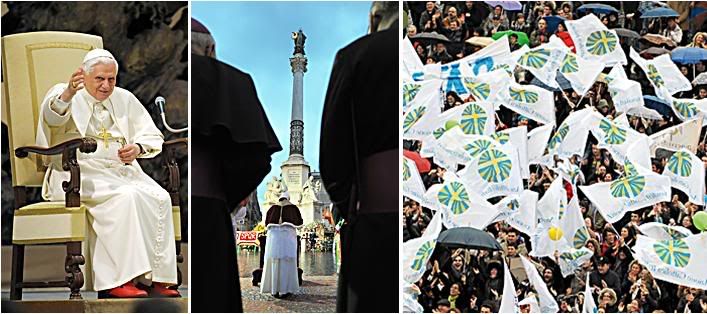 This double issue also covers the Pope's Angelus and homage to the Immaculate Conception at Piazza di Spagna on Tuesday,
This double issue also covers the Pope's Angelus and homage to the Immaculate Conception at Piazza di Spagna on Tuesday,
with an editorial on his remarks about Mary and the city of Rome. in international news: Pessimism that any binding
international agreement will come out of the Copenhagen conference for climate change. The inside pages have a number
of excellent articles related to the opening in Rome today of a three-day international conference on God, sponsored by
the Cultural Project of the Italian bishops' conference.
 THE POPE'S DAY
THE POPE'S DAY
The Holy Father met today with
- H.E. Ali Bongo Ondimba, President of Gabon, with his wife and delegation
- H.E. Eduardo Delgado Bermúdez, Ambassador from Cuba, who presented his credentials.
Address in Spanish.
- Mons. Robert Sarah, Archbishop Emeritus of Conakry (Guinea) and
Secretary of the Congregation for the Evangelization of Peoples.
- Carl A. Anderson, Supreme Knight of the Knights of Columbus, and
Mons. William Edward Lori, Bishop of Bridgeport (Connecticut)
Also at the Vatican today:
The formal exchange of instruments of ratification of the Agreement between the Holy See and the Federative Republic
of Brazil which was signed in November 2008 and recently ratified by the Brazilian Parliament. Participating in
the exchange were, for the Vatican, Mons. Dominique Mamberti, secretary for relations with states, and for Brazil,
Ambassador Felipe de Seixas Corrêa.
[Modificato da TERESA BENEDETTA 10/12/2009 23:19] |
| |
 10/12/2009 15:14 10/12/2009 15:14 |
|
| | | OFFLINE | | Post: 19.049
Post: 1.696 | Registrato il: 28/08/2005
Registrato il: 20/01/2009 | Administratore | Utente Veteran | |
|
 AUDIENCE FOR
AUDIENCE FOR
THE PRESIDENT OF GABON
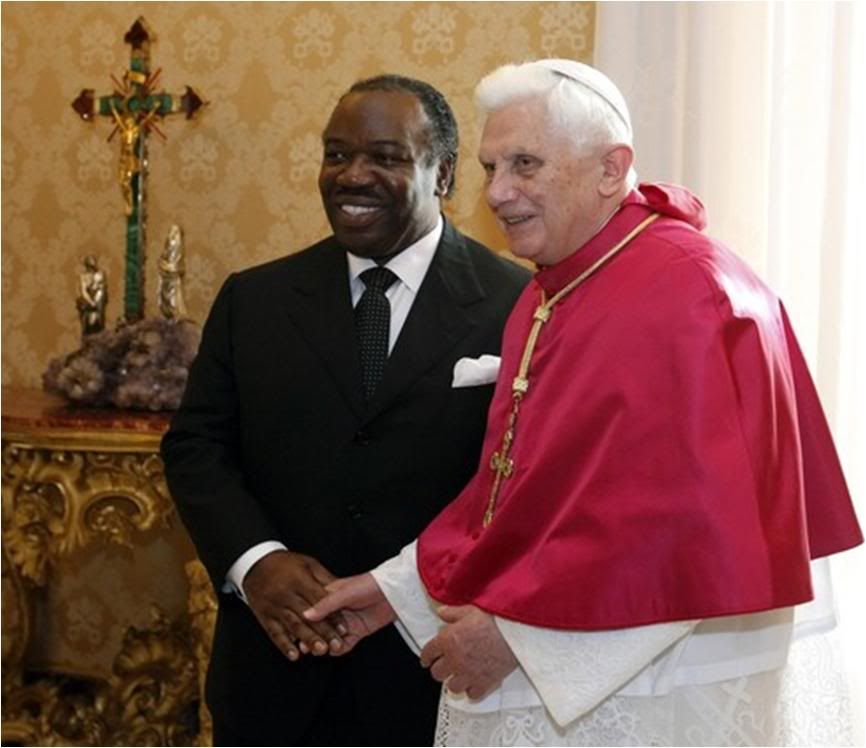
Communique
Translated from
 Dec. 10. 2009
Dec. 10. 2009
The Holy Father Benedict XVI today received in audience the President of the Republic of Gabon, H.E. Ali Bongo Ondimba, who later met with Cardinal Tarcisio Bertone, Secretary of State, and Mons. Dominique Mamberti, secretary for relations with states.
During the conversations, they recalled the late President El Hadj Omar Bongo Ondimba, who died recently. There have been good relations between the Holy See and Gabon in the context of the framework agreement conculded in 1997 and its subsequent developments.
The talks dwelt on the contribution that Catholics make to the integral progress of the Gabonese, particularly in the field of education.
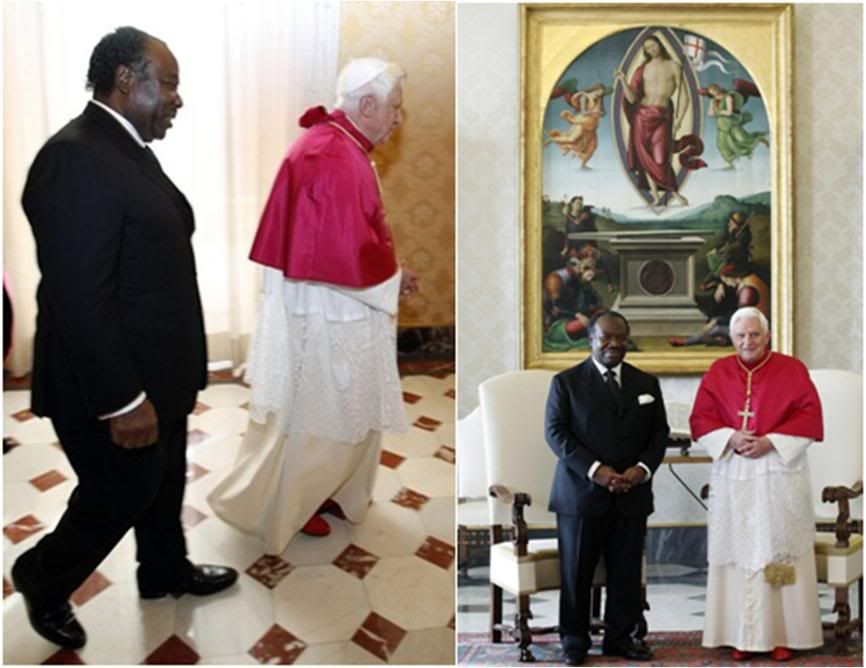
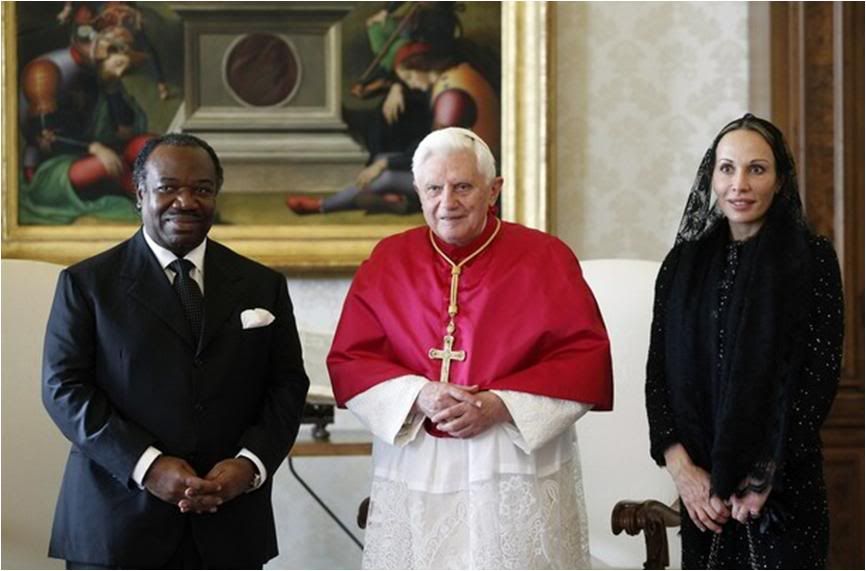
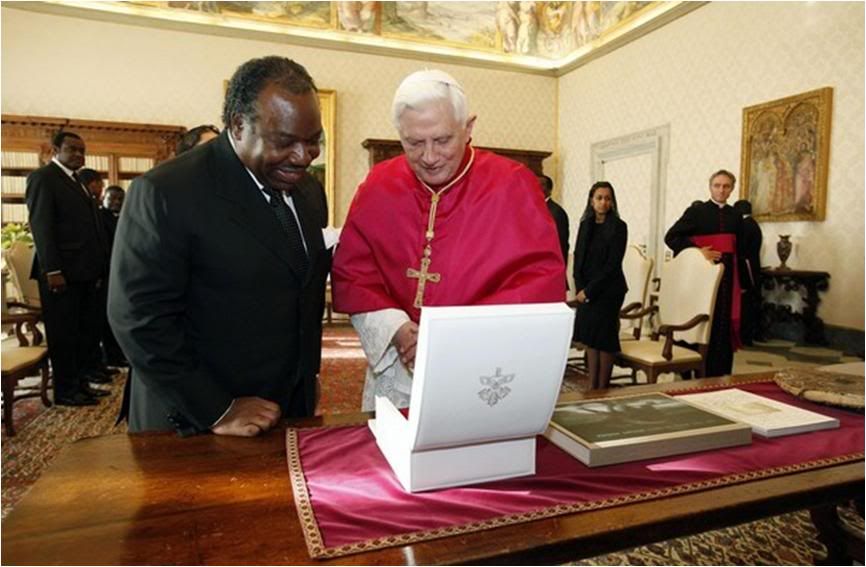
|
| |
 10/12/2009 18:01 10/12/2009 18:01 |
|
| | | OFFLINE | | Post: 19.050
Post: 1.697 | Registrato il: 28/08/2005
Registrato il: 20/01/2009 | Administratore | Utente Veteran | |
|


 To the international conference on God:
To the international conference on God:
Benedict XVI reiterates the Christian task
to make God present in the world
More than 2,000 perticipants are registered for the international conference on God organized by the Cultural Project of the Italian Bishops' Conference (CEI) which opened today in Rome at the Auditorium on Via della Conciliazione. It is sponsored by the city and commune of Rome.
Before expressing his own greetings to open the conference, Cardinal Angelo Bagnasco, president of the CEI, expressed his thanks to the Holy Father, Primate of Italy, "for the letter which he was good enough to send me for this occasion, highlighting the theme and primary purpose of this international event to discuss God".
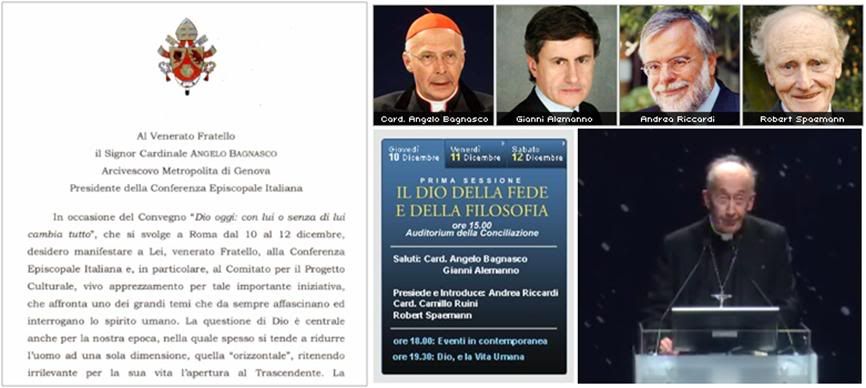
Day 1 of the conference is on the theme 'God of the faith, God of the philosophers'. Opening day speakers were Cardinal Bagnasco and the Mayor of Rome, Gianni Alemanno; historian Andrea Riccardi of the Sant'Egidio Community; Cardinal Camilo Ruini, head of the CEI Cultural project; and German philosopher Robert Spaemann.
The newly redesigned web site of the CEI carries the proceedings on streaming video in real time.
www.chiesacattolica.it/cci2009/index.html
Click on the conference logo 'DIO OGGI' for direct access to the conference proceedings.
The CEI has released the text of the Holy Father's letter, translated below:
To my Venerated Brother
Cardinal ANGELO BAGNASCO
Archbishop of Genoa
President of the Italian Bishops' Conference
On the occasion of the conference "Dio oggi: con lui o senza di lui cambia tutto", which takes place in Rome December 10-12, I wish to express to you, venerated Brother, to the Italian bishops' conference, particularly to the Committee for the Cultural Project, my sincere appreciation for such an important initiative which confronts one of teh great issues that has always fascinated and interpellated the human spirit.
The question of God is central even for our age, which often tends to reduce man to one dimension, the 'horizontal', considering an opening to the Transcendent as irrelevant to hils life.
On the contrary, the relationship with God, is essential for mankind's journey, and as I have had occasion to affirm many times, it is the task of the Church and every Christian to make God present in the world, to seek to open for man the way to God.
This is the perspective for this international event. The breadth of the approach to the issue which characterizes the conference will allow drawing up a rich and detailed framework for the question of God, but above all, it will be a stimulus for more profound reflection on the place that God occupies in the culture and life of our time.
On the one hand, it will show the various ways that lead towards affirming the truth regarding the existence of God, the God that mankind has always known in some way, even in the shadows of history, the God who revealed himself with the splendor of his face to the People of Israel, and beyond every measure and hope, fully and definitively in Jesus Christ.
He is the Son of God, the Living One who enters human life and history to enlighten with his grace, with his presence.
On the other hand, it will highlight the essential importance that God has for us, for our personal and social life, for understanding our own selves and the world, for the hope that illumines our journey, for the salvation that awaits us beyond death.
The many interventions will be addressed to these objectives, according to multiple perspectives that will be the object of study and discussion: from philosophical and theological reflection to the testimonies of the great religions; from the impulse towards God which finds expression in music, literature, the figurative arts, cinema and television, to the developments in science which seek to read profoundly into the mechanisms of nature, fruit of the Creator God's intelligent work; from the analysis of personal experiences of God to considerations of the social and political dynamics in a world that has become globalized.
In the spiritual and cultural situation such as we are experiencing, where the tendency to relegate God to the private sphere is growing, to consider him irrelevant and superfluous, or to reject him explicitly, I hope with all my heart that this event may contribute at the very least to dissipate the shadows that make an opening to God precarious and fearsome for the man of our time, although God never ceases to knock on our door.
The experience of the past that is not so far removed from us teaches us that when God disappears from man's horizon, mankind loses orientation and is in danger of taking steps towards his own destruction.
Faith in God opens man to a sure hope that does not disappoint. It indicates the solid foundation on which one can rest one's life without fear. It asks us to abandon ourselves with trust into the hands of Love that supports the world.
To you, Eminence, to all who have contributed to prepare for this conference, to the lecturers and all the participants, my heartfelt greeting and wishes for the full success of this initiative.
I will accompany your work with my prayers and with my Apostolic Blessing as a token of that light from above that makes us capable of finding in God our treasure and our hope.
From the Vatican
December 7, 2009


[Modificato da TERESA BENEDETTA 11/12/2009 02:51] |
| |
 10/12/2009 20:49 10/12/2009 20:49 |
|
| | | OFFLINE | | Post: 19.051
Post: 1.698 | Registrato il: 28/08/2005
Registrato il: 20/01/2009 | Administratore | Utente Veteran | |
|

 The Pope in Sulmona
The Pope in Sulmona
on July 4, 2010:
His third visit to the region
by Annalisa Civitareale
Translated from

Dec. 9, 2009
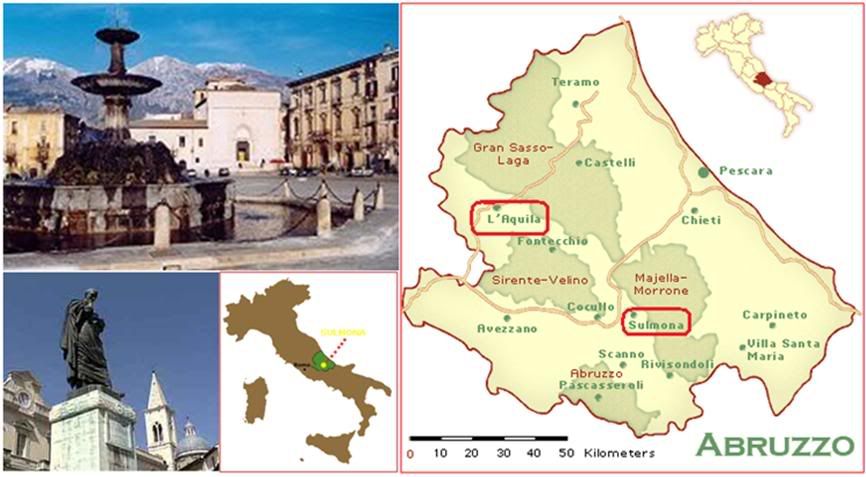 Sulmona in the Abruzzo region is about 170 kms east of Rome, and is best known as the birthplace of the famous classical poet Ovid.
Sulmona in the Abruzzo region is about 170 kms east of Rome, and is best known as the birthplace of the famous classical poet Ovid.
Tthe Benedictine monk Pietro di Morrone who would become Pope Celestine V (1215-1296), later a saint, was born in a nearby village.
SULMONA - July 4, 2010, will be a historic date for Sulmona.
Pope Benedict XVI will be here for the eighth centenary of the birth of Pope Celestine (better known locally as Papa Pietro Celestino, which incorporates the Pope's baptismal name).
Mons. Angelo Spina made the official announcement at Mass on Tuesday in the cathedral of San Panfilo, on the day of the Immaculate Conception - which made it a doubly joyous day for the faithful of the diocese, who responded with long and loud applause.
It will be Benedict XVI's third visit to the Abruzzo region. [He was in Manoppello in 2006, and in L'Aquila after the earthquakes last spring.]
"Dearest brothers and sisters, today on the Solemnity of the Immaculate Conception of the Blessed Virgin Mary, with great emotion and joy, I am happy to announce to the entire diocese of Sulmona-Valva and to the Abruzzo-Molise cclesiastical region that on Sunday, July 4, 2010, the Holy Father Benedict XVI, in response to the invitation I sent him in a letter of October 26, 2009, has agreed to visit Sulmona on the occasion of the eighth centenary of the birth of San Pietro Celestino".
Simple words from Bishop Spina who announced the good news before his homily.
The Pope will also visit three other dioceses in Italy in 2010: Turin on May 2, Carpineto Romano on September 5, and Palermo on October 3.
Details of the Pope's visit to Sulmona still have to be worked out, but what is sure is that Sulmona will be his only stop.
He will come to the Basilica of San Panfilo to venerate the relics of his predecessor.
These relics include robes, sandals, a cilicium, shoes, a papal tunic all belonging to Celestine, and most importantly, part of his heart,
had been donated to Sulmona in 1906 by the Bishop of Ferentino [the diocese where Celestine died in prison, under his successor Boniface VIII. Celestine resigned as Pope less than six months after he was elected in 1294, in order to return to his hermit's life, the only Pope to have resigned].
This particular relic was brought to the Vatican to be blessed by a delegation of some 2,500 Sulmona faithful who attended an audience with Pope Benedict last September 30.
[Benedict had earlier venerated the mortal remains of Celestine in the Basilica of Collemaggio in L'Aquila (where Celestine was crowned Pope), during his visit there after the March earthquakes, and donated the pallium he had worn at his inaugural Mass as Pope.]
After the visit to the Cathedral, the Pope will say Mass and the Angelus at the city's Piazza Garibaldi.
Mons. Spina said he received the news of the Pope's decision two days earlier. "I received a telephone call from the Prefecture of the Pontifical Household informing me that the Pope had accepted our invitation, that he would be coming here on July 4, and that I could announce the news to the diocesan community on the Feast of the Immaculate Conception".
He added: "This is a great gift to us, but it is also a great responsibility to welcome the Successor of Peter among us, with conversion of hearts in the diocese."
The Jubilee year for Pope Celestine has been marked by events linking the diocese to the Pope.
"On July 18, the Pope's brother, Mons. Ratzinger*, came to visit Sulmona. Then when we had the audience with the Pope, I said to him that Sulmona was awaiting a visit by him. On October 26, I sent him a letter to invite him officially, but with feeble hope because I am aware of his many commitments. Instead, we got the good news two days ago, which is cause for joy and hope for the entire territory".
The parish priest of San Panfilo, don Maurizio Buzzelli, echoed the bishop's words. "The Pope's visit brings hope to a region that has been experiencing economic difficulties and unemployment".
* A report and photos of Mons. Ratzinger's visit to Sulmona is in the PEOPLE AROUND THE POPE thread:
benedettoxviforum.freeforumzone.leonardo.it/discussione.aspx?idd=8589119&p=2&#idm...
[Modificato da TERESA BENEDETTA 11/12/2009 01:53] |
| |
 10/12/2009 21:07 10/12/2009 21:07 |
|
| | | OFFLINE | | Post: 19.052
Post: 1.699 | Registrato il: 28/08/2005
Registrato il: 20/01/2009 | Administratore | Utente Veteran | |
|
 Pope Benedict to new Cuban ambassador:
Pope Benedict to new Cuban ambassador:
Appreciates increasing religious freedom
in Cuba and urges reconciliation with US

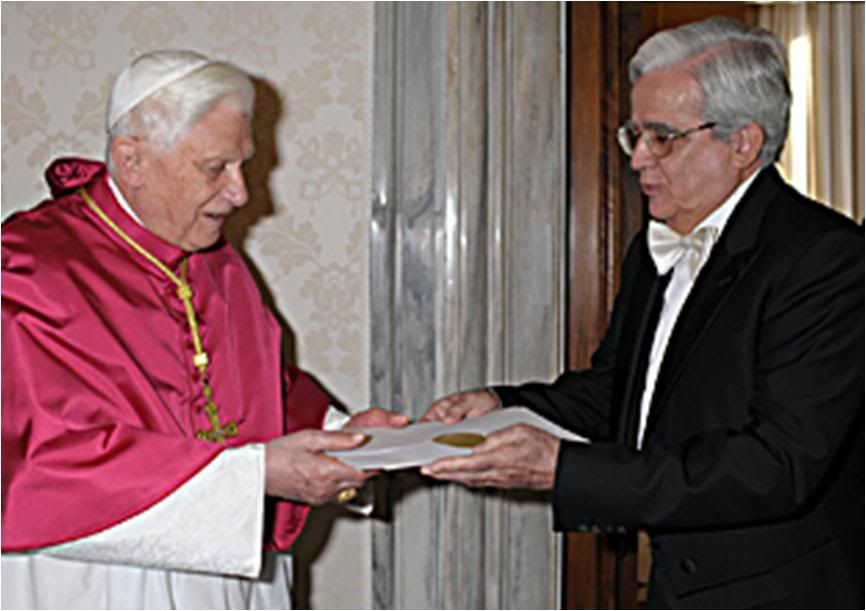
VATICAN CITY, Dec. 10 (AP) — Pope Benedict XVI said Thursday there are growing signs of religious freedom in Cuba and that there is an opportunity for reconciliation between the communist nation and the United States.
Welcoming Havana's new ambassador to the Vatican, Benedict also expressed sympathy for Cuba's suffering during the global downturn as well as "the devastating effects of natural disasters and the economic embargo."
President Barack Obama has loosened some travel and financial restrictions, and the two countries have discussed re-establishing direct mail links. Still, Washington has made clear it has no intention of ending its embargo unless Cuba undertakes political, economic and social reform.
Benedict told Eduardo Delgado Bermudez that "certain signs of openness in relations with the neighboring United States presage new opportunities for a mutually beneficial rapprochement."
He spoke in Spanish and the Vatican provided an official English translation.
Benedict cited encouraging signs of religious freedom, including the celebration of Mass in some prisons, a new tolerance of religious processions, the refurbishment of some church buildings, and the extension of social security to the clergy.
"It is my hope that tangible signs of openness in the exercise of religious freedom will continue to increase, as has been happening over recent years," Benedict said in a speech.
Cuba's single-party, communist government never outlawed religion, but expelled priests and closed religious schools when Fidel Castro took power in January 1959.
Relations between the Church and the government have improved considerably since Pope John Paul II toured the island in 1998.
Here is a full translation of the Holy Father's remarks, delivered in Spanish, to the new ambassador:
Mr. Ambassador:
1. I welcome you with great pleasure on this solemn act in which you have presented your Letters of Accreditation as Ambassador Extraordinary and Plenipotentiary of the Republic of Cuba to the Holy See, thus initiating the important mission that your Government has entrusted to you.
I thank you for your kind words and the greeting that you conveyed from the His Excellency Raul Castor Ruz, President of the Councils of State and of Ministers, to whom I respond with my best wishes for his great responsibility.
2. In the midst of illusions and difficulties, Cuba has achieved a determined protagonism, principally in the economic and political context of the Caribbean and Latin America.
On the other hand, some signs of relaxation in its relations with its neighbor, the United States, would seem to presage new opportunities for mutually beneficial rapprochement, with full respect for the sovereignty and the rights of States and their citizens.
Cuba, in offering many countries its collaboration in vital areas like literacy and health, promotes international cooperation and solidarity, without other interests besides actual assistance to needy populations.
It is to be hoped that all this can contribute to the realization of the appeal made by my venerated predecessor, Pope John Paul II, on his historic visit to the island: "May Cuba open up to the world with all its magnificent possibilities, and may the world open up to Cuba!" (Address at arrival in Havana, Jan. 21, 1998).
3. Like many other countries, your homeland too is suffering from the consequences of the grave world crisis, which, added to the devastating effects of natural disasters and the economic embargo [by the United States], strikes most especially at the poorest individuals and families.
In this complex general situation, there is an urgent necessity for an economy built on solid ethical foundations, that places the person and his rights, along with his material and spiritual well-being, at the center of its interests.
In effect, the primary capital that must be safeguarded and saved is man - the person in his entirety (cf. Caritas in veritate, 25).
It is important that Governments strive to remedy the serious effects of the financial crisis without neglecting attention to the basic needs of their citizens.
The Catholic Church in Cuba, which these days as always, feels close to the people, wishes to contribute with her own modest assistance. I wish to point out that greater cooperation from the authorities of your country has allowed the realization of important aid and reconstruction projects, especially in the aftermath of natural disasters.
4. I hope that the concrete signs of a more open exercise of religious freedom, which has been happening in the past several years, will continue to multiply - such as, for instance, the opportunity to say Holy Mass in jails, holding religious processions, the repair and recovery of some churches and the construction of religious houses, or the possibility of social security for priests and religious. In this way, the Catholic community can exercise more easily its specific pastoral tasks.
With a view to progress along this line, especially for the benefit of Cuban citizens, it would also be desirable to continue dialog in order to set together - following a form similar to those that has been established with other nations and respecting the specific characteristics of your country - the juridical framework which will define the existing relations, which were never interrupted, between the Holy See and Cuba, in order to guarantee the adequate development of the life and pastoral activity of the Church in your nation.
5. The Catholic Church in your country is preparing with full intensity for the celebration in 2012 of the fourth centenary of the finding and presence of the blessed image of the Virgin of Charity of Cobre, Mother and Patroness of Cuba.
This beloved Marian evocation is a luminous symbol of the religiosity of the Cuban people and the Christian roots of their culture.
Indeed, the Church, which is not to be confused with the political community (cf. Gaudium et spes, 76), is the repository of an extraordinary spiritual and moral patrimony which has contributed decisively to forge the Cuban 'soul', endowing it with its character and personality.
In this respect, all the men and women, but especially, the young people, need today, as in any other age, to rediscover those moral, human and spiritual values such as, for example, respect for life from conception to natural death, which gives dignity to human existence.
In this sense, the principal service that the Church can do for Cubans is the announcement of Jesus Christ and his message of love, forgiveness and reconciliation in truth. A nation that follows the path of concord is a nation with hope in a better future.
Moreover, the Church, conscious that its mission would be seriously crippled without the testimony of charity that springs from the Heart of Christ, has undertaken in your country numerous initiatives of social assistance which, although of modest dimensions, do reach many who are sick, old and handicapped.
An eloquent demonstration of this love is the life and work of so many persons who allowed themselves to be enlightened and transformed by the message of Christ, like Blessed Juan Olalio Valdez, whose beatification, the first ever realized on Cuban soil, was attended by His Excellency the President.
I am confident that this climate, which has allowed the Church to give its modest contribution in charity, may also favor her participation in the means of social communications and in the realization of complementary educational tasks in keeping with her specific pastoral and spiritual mission.
6. I cannot conclude my remarks without addressing a last thought for the always noble, fighting, suffering and working Cuban people, expressing to them from the heart my closeness and affection, even as I do not cease to commend them in my prayers to the Lord, author of all gifts.
Mr. Ambassador, I ask you again to kindly reiterate my deferential greeting to the highest authorities of the Republic of Cuba, as I express to Your Excellency my best wishes that you may happily and fruitfully achieve the high mission that you start today to the Holy See, and I invoke upon you, your family and co-workers, the abundant gifts of the Most High, through the intercession of Our Lady of Charity of Cobre.

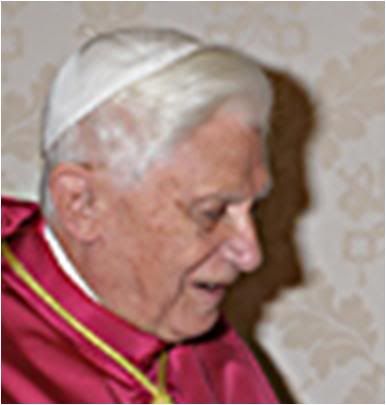 Oh, dear! is the only civil comment I can find to say about
Oh, dear! is the only civil comment I can find to say about
the latest depredation wrought by the Pope's barbarous barber!
[Modificato da TERESA BENEDETTA 12/12/2009 01:20] |
| |
 11/12/2009 01:21 11/12/2009 01:21 |
|
| | | OFFLINE | | Post: 19.053
Post: 1.700 | Registrato il: 28/08/2005
Registrato il: 20/01/2009 | Administratore | Utente Veteran | |
|

 If only all environmental ideologues were as balanced as Benedict XVI in promoting respect for the environment without undue apocalyptic alarmism - which is most probably quite unwarranted on scientific grounds, and criminally reprehensible if junk science forces the world into unnecessarily draconian measures... Prudent action now, yes, by all means, but it must be reasonable and measured, not cause unacceptable economic burdens to those who can least afford it, or even to the middle class who usually bear the tax burden for any new initiative.
If only all environmental ideologues were as balanced as Benedict XVI in promoting respect for the environment without undue apocalyptic alarmism - which is most probably quite unwarranted on scientific grounds, and criminally reprehensible if junk science forces the world into unnecessarily draconian measures... Prudent action now, yes, by all means, but it must be reasonable and measured, not cause unacceptable economic burdens to those who can least afford it, or even to the middle class who usually bear the tax burden for any new initiative.
But then, they are ideologues, who are robots totally controlled by their ideology, whereas Benedict XVI is a genuine thinking man, and better still, an exemplary Christian. Luigi Accattoli reflects on the Christian ecology of Benedict XVI.
Papa Ratzinger's many urgings
for mutually supportive development
The Pope in defense of Earth, God's masterwork -
but the Church's ecological calling is not recent!
by Luigi Accattoli
Translated from

Dec. 10, 2009
Last Sunday the Pope called on the climate-change summit in Copenhagen to decide in favor of initiatives that are "respectful of Creation and which will promote mutually supportive development".
"Safeguarding Creation" - he said, using an expression that was formulated more than 30 years ago in German ecumenical circles - "postulates the adoption of moderate and responsible life styles, especially with respect to the poor and to future generations."
We have an ecologically-minded Pope who insists on respect for Creation even if it seems few are heeding him, at least on this issue, both within and outside the Church.
Once before, despite his reluctance for any kind of protagonism, he had come to advocating a Christian-Catholic movement: "I call on you to pray and work with me towards greater respect for the wonders of God's creation", he said on Sept. 5, 2007.
The necessity to promote "responsible governance of nature" is advocated in his encyclical Caritas in veritate from last July, in which he lists 'safeguarding the environment' among the reasons that should convince mankind to consider 'a global political authority with supranational powers'.
Perhaps, he expressed himself on the issue most forcefully to a massive youth assembly in Loreto in September 2007: "Before it is too late, courageous choices must be made to recreate a strong alliance between man and the earth".
Also that month, on a pastoral visit to Velletri, he said that "the logic of profit, if it prevails, increases the disproportionate gap between rich and poor, as well as ruinous exploitation of the planet".
This Pope's truly extraordinary attention to ecological issues has influenced the diplomatic activity of the Holy See, which is present in Copenhagen with a delegation led by Archbishop Celestino Migliore, the Vatican's permanent observer at the United Nations.
Outside the UN environment, bishops and representatives of humanitarian agencies from 25 countries have teamed up to advocate 'climate justice' in Copenhagen.
Many Catholics are also adherents of the Bell Ringing campaign proposed by the Council of Danish Churches, with the support of the World Council of Churches: on Sunday, when the Copenhagen conference is midway through, at 3 p.m. Copenhagen time, all the bells in the churches taking part in the campaign will ring everywhere - around the world, they say - to ask for concrete decisions.
[A good momentary attention-getter and an appropriate gesture for churches, but sort of out of touch with the pre-programmed realities of all international gatherings these days - namely, that conferences are simply a way to allow everyone to blow off their hot air on the world stage, since the powers that run these conferences already know that the final conference communique will say.
The participants in Copenhagen knew going in that the conference would result in nothing better than a consensus on intentions, given that the two most populous nations on earth, who account for one-third of the world's population, have said they will set their own voluntary measures to control greenhouse gas emissions and will not be bound by anything the other nations may agree on.]
To understand the Holy Father's position, here is what deputy secretary of state Mons. Pietro Parolin said at the United Nations in September 2007 on the challenge posed by global climate changes.
He presented the Vatican stand as a third way between radical environmentalism [but these are the ones who completely control the Copenhagen conference!] and a denial of the ecological problem, advocating the adoption of a coordinated political strategy that is agile, effective and capable of dealing with such a complex problem" that would also bear "the economic costs for the negative consequences of climate change on poor nations" [about which data is so far insufficient and inconclusive].
Attention to the environment is not new in papal teaching. In 1979, John Paul II declared Francis of Assisi as the patron saint of ecology, and he dealt with the issue many times. In the 1991 social encyclical Centesimus Annus, he affirmed the concept of 'human ecology' (Par. 38).
This concept has been developed by Papa Ratzinger who discusses it in his last encyclical.
In a message on May 1, 2007, to the Pontifical Academy of Social Sciences, he said that human ecology "demands a responsible relationship not only with Creation but even with our neighbor, far and near in space and time, and with the Creator".
It is striking to find this insistence on ecological responsibility for a Pope who normally draws back from adopting the fashionable issues that occupy media and the public discourse.
But basic to his passion is the desire to give voice to the need for clean air and potable water for the poorest, least cared for persons in society today - who are in no way represented by the environmental ideologs.
But I think there are also cultural reasons that motivate him personally. The ecological movement was born in his own Germany, to begin with. But it is also an issue that allows a recovery of Biblical and Christian motivations (think of Franciscanism) capable of refuting the attacks of radical ecologists on the Judaeo-Christian tradition.
Finally, he is aware that Christian teaching cannot ignore the ecological issue which highlights the relationship between man, the cosmos and history - moved by the primary concern that in dealing with the issue, the fourth and most 'ranking' protagonist of all, God, should never be forgotten.
"If God is absent," he said last Nov.8, in a message to the bishops of Italy, "there is no compass to find the way along which to proceed".
[Modificato da TERESA BENEDETTA 12/12/2009 02:57] |
| |
 11/12/2009 14:07 11/12/2009 14:07 |
|
| | | OFFLINE | | Post: 19.054
Post: 1.701 | Registrato il: 28/08/2005
Registrato il: 20/01/2009 | Administratore | Utente Veteran | |
|
 Friday, December 11
Friday, December 11
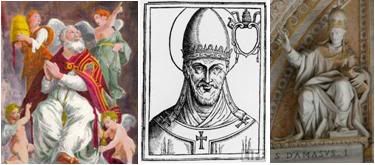 ST. DAMASUS (POPE DAMASUS I, 366-384) (b Lusitania [Portugal] ca 305, d Rome 384)
ST. DAMASUS (POPE DAMASUS I, 366-384) (b Lusitania [Portugal] ca 305, d Rome 384)
The son of a Roman priest, Damasus was described by his secretary St. Jerome as
“an incomparable person, learned in the Scriptures, a virgin doctor of the virgin
Church, who loved chastity and heard its praises with pleasure.” He served Pope
Liberius and was elected to succeed him in 366. But opponents elected an anti-Pope
Ursinus, and violent battles between teh two camps followed, that ended only after
Valentinian became emperor and exiled Ursinus. Damasus commissioned Jerome to
translate the entire Bible into what became the first standard version of all 72 books,
the Vulgate. Damasus is also remembered for uncovering the Roman catacombs to pay
proper homage to the early Christian martyrs. He defended Christian orthodoxy
against Arianism and other heresies and was upheld by the Council of Constantinople
in 382. He strengthened the faith after it became the official religion of empire
with his liturgical and esthetic enhancement of the churches of Rome, and defended
the rights of the Papacy in the imperial setting.
OR today.
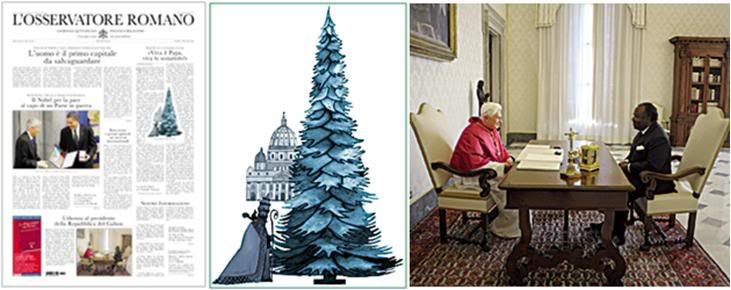 Strangely, the main papal story on Page 1, about the Pope's address to the new Cuban ambassador, under the headline "Man is
Strangely, the main papal story on Page 1, about the Pope's address to the new Cuban ambassador, under the headline "Man is
the primary capital to be safeguarded', did not merit a picture, the editors choosing instead to use a photo of Barack Obama
receiving the Nobel Peace Prize. Other Page 1 stories are the Pope's audience for the President of Gabon (photo), and an editorial
commentary on a new children's book recounting the story of a Vatican Christmas tree, a squirrel that came with it, and
a conversation between the squirrel and John Paul II - as an excellent example of how to carry across the Church's ecological
message. In the inside pages, the Pope's message to the international conference on God taking place in Rome this week, and
a true story with photos about a rare white blackbird that the Pope and his secretaries had spotted while walking in the Vatican
Gardens. At the Pope's request, one of the secretaries, Mons. Xuereb, had a camera ready to take pictures of the 'merlo bianco'
as soon as they could spot him again. Unfortunately, the online posting by OR does not include the story or the photos.
THE POPE'S DAY
At 9 a.m., the Holy Father joined the Roman Curia at the Redemptoris Mater chapel of the Apostolic Palace
to listen to the second Advent sermon of Fr. Raniero Cantalamessa, Preacher of the Papal Household.
Later he met with
- H.E. Nguyen Minh Triet, President of the Republic of Vietnam, and his delegation
- Members of the Irish bishops' conference to discuss the recent government report on offenses by priests
against minors in the Diocese of Dublin.
And in the afternoon, with
- Cardinal William Joseph Levada, Prefect of the Congregation for the Doctrine of the Faith (weekly meeting)
[Modificato da TERESA BENEDETTA 11/12/2009 16:06] |
| |
 11/12/2009 16:15 11/12/2009 16:15 |
|
| | | OFFLINE | | Post: 19.055
Post: 1.702 | Registrato il: 28/08/2005
Registrato il: 20/01/2009 | Administratore | Utente Veteran | |
|


 POPE MEETS IRISH BISHOPS
POPE MEETS IRISH BISHOPS
TO DISCUSS CHILD ABUSE REPORT
Here is the communique released in English by the Vatican press Office after the meeting today:
COMMUNIQUE
 Today the Holy Father held a meeting with senior Irish Bishops and high-ranking members of the Roman Curia. He listened to their concerns and discussed with them the traumatic events that were presented in the Irish Commission of Investigation’s Report into the Catholic Archdiocese of Dublin.
Today the Holy Father held a meeting with senior Irish Bishops and high-ranking members of the Roman Curia. He listened to their concerns and discussed with them the traumatic events that were presented in the Irish Commission of Investigation’s Report into the Catholic Archdiocese of Dublin.
After careful study of the Report, the Holy Father was deeply disturbed and distressed by its contents. He wishes once more to express his profound regret at the actions of some members of the clergy who have betrayed their solemn promises to God, as well as the trust placed in them by the victims and their families, and by society at large.
The Holy Father shares the outrage, betrayal and shame felt by so many of the faithful in Ireland, and he is united with them in prayer at this difficult time in the life of the Church.
His Holiness asks Catholics in Ireland and throughout the world to join him in praying for the victims, their families and all those affected by these heinous crimes.
He assures all concerned that the Church will continue to follow this grave matter with the closest attention in order to understand better how these shameful events came to pass and how best to develop effective and secure strategies to prevent any recurrence.
The Holy See takes very seriously the central issues raised by the Report, including questions concerning the governance of local Church leaders with ultimate responsibility for the pastoral care of children.
The Holy Father intends to address a Pastoral Letter to the faithful of Ireland in which he will clearly indicate the initiatives that are to be taken in response to the situation.
Finally, His Holiness encourages all those who have dedicated their lives in generous service to children to persevere in their good works in imitation of Christ the Good Shepherd.
Pope 'shares outrage and shame'
at Murphy report on child abuse
by PADDY AGNEW in Rome and ELAINE EDWARDS

Dec. 11, 2009
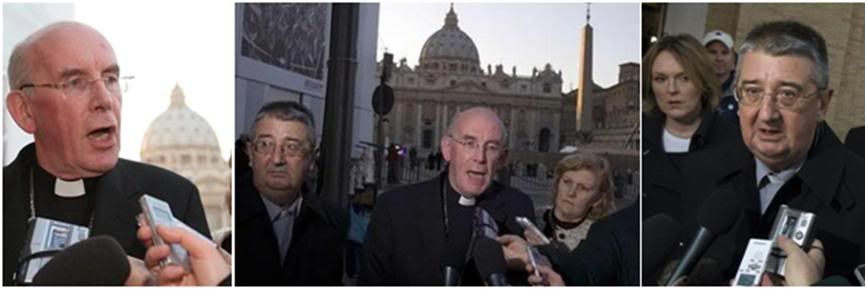 Archbishops Brady and Martin speak to newsmen after the meeting with the Pope.
Archbishops Brady and Martin speak to newsmen after the meeting with the Pope.
Pope Benedict shares the "outrage, betrayal and shame" felt by the Irish people over the Murphy report into the handling of allegations of child sex abuse in the Dublin archdiocese, the Vatican has said.
In a statement issued after the Pope held a meeting with Cardinal Seán Brady and Archbishop of Dublin Diarmuid Martin, the Vatican also said the Pope was "disturbed and distressed" by the contents of the report published last month.
He will write a pastoral letter to the Irish people about sexual abuse in Ireland and the Vatican's response to the crisis.
The Pope held a 90-minute meeting with the two church leaders this morning to discuss the “painful situation of the church in Ireland” in the wake of the publication of the Murphy commission report.
"The Holy Father shares the outrage, betrayal and shame felt by so many of the faithful in Ireland, and he is united with them in prayer at this difficult time in the life of the church," the statement said.
"The Holy Father was deeply disturbed and distressed by its contents. He wishes once more to express his profound regret at the actions of some members of the clergy who have betrayed their solemn promises to God, as well as the trust placed in them by the victims and their families, and by society at large."
The statement said the Pope was asking for prayers for the victims of "these heinous crimes" and promised that the Vatican would "develop effective and secure strategies to prevent any recurrence".
It said the Pope and the Vatican took the issues raised by the report "very seriously" including "questions concerning the governance of local Church leaders with ultimate responsibility for the pastoral care of children".
Pope Benedict was accompanied by a delegation of Curia heavyweights including, among others, the secretary of state, Cardinal Tarcisio Bertone, the prefect for the Congregation of Bishops, Cardinal Giovanni Battista Re, the prefect for the Congregation For the Doctrine of the Faith, Cardinal William Levada, the prefect for the Congregation of the Clergy, Cardinal Claudio Hummes and the prefect of the Congregation of Consecrated Life (Religious Orders) Franc Rodé. The papal nuncio in Ireland, Archbishop Giuseppe Leanza, was also present.
When John Paul II met the US bishops in the Vatican to discuss the US clerical sex abuse crisis in April 2002, he issued a strong statement in which he said, “people need to know that there is no place in the priesthood and religious life for those who would harm the young”.
Pope 'ashamed and outraged'
at conduct of Irish priests and bishops
on child abuse and will address
pastoral letter to the Irish people
By Philip Pullella

VATICAN CITY, Dec. 11 (Reuters) – Pope Benedict shares the "outrage, betrayal and shame" felt by the Irish people over a government report that said Church leaders covered up widespread sexual abuse of children for 30 years, the Vatican said on Friday.
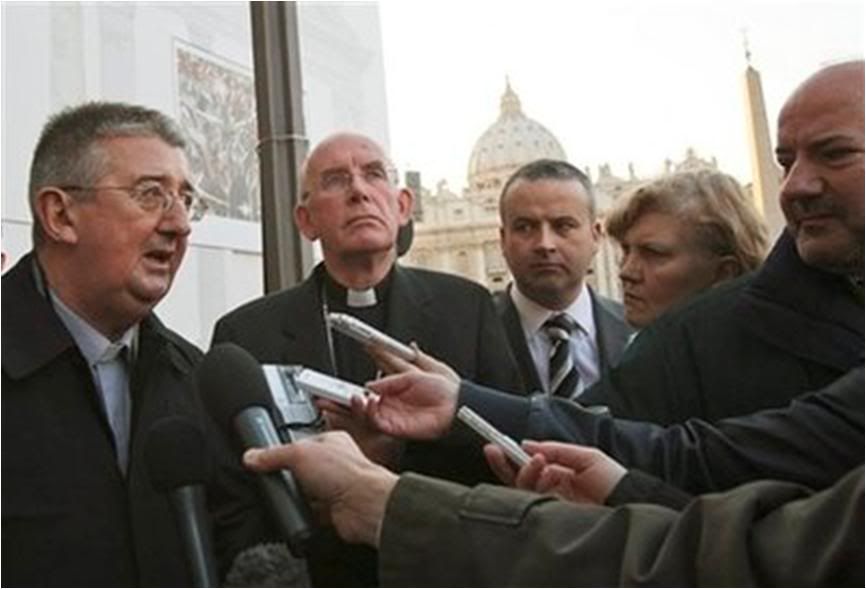 Archbishop Martin questioned by journalists.
Archbishop Martin questioned by journalists.
In a statement issued after the Pope held a meeting with Irish Church leaders, the Vatican also said the Pope was "disturbed and distressed" by the report. He will write a pastoral letter to the Irish people about sexual abuse in Ireland and the Vatican's response to the crisis.
"The Holy Father shares the outrage, betrayal and shame felt by so many of the faithful in Ireland, and he is united with them in prayer at this difficult time in the life of the Church," the statement said.
The meeting, which lasted about 90 minutes, was held to discuss the crisis in the Irish Church following the publication last month of the Murphy Commission Report.
The November 26 report said the Church in the overwhelmingly Catholic country had obsessively hidden child abuse during the period of an inquiry, which covered the handling of abuse reports by the archdiocese of Dublin from 1975 to 2004.
"The Holy Father was deeply disturbed and distressed by its contents. He wishes once more to express his profound regret at the actions of some members of the clergy who have betrayed their solemn promises to God, as well as the trust placed in them by the victims and their families, and by society at large," the statement said.
The Murphy report said the Church was "obsessively" concerned with secrecy and operated a policy of "don't ask, don't tell" about abuse.
All Dublin archbishops in charge during the period were aware of some complaints and the archdiocese was more preoccupied with protecting the reputation of the Church than safeguarding children's welfare, the report said.
Friday's Vatican statement said the Pope was asking for prayers for the victims of "these heinous crimes" and promised that the Vatican would "develop effective and secure strategies to prevent any recurrence."
It said the Pope and the Vatican took the issues raised by the report "very seriously" including "questions concerning the governance of local Church leaders with ultimate responsibility for the pastoral care of children."
Pope will write letter
to Irish Catholics on abuse

VATICAN CITY, Dec. 11 (AP) – Pope Benedict XVI is deeply disturbed by a child sex-abuse scandal in Ireland and will write a letter to Catholics there on the Church's response, the Vatican said Friday.
Benedict met at the Vatican with senior Irish clergy to discuss a possible response to a devastating report issued last week in Dublin, which found that the Church in Ireland [specifically the Archdiocese of Dublin] shielded more than 100 child-abusing priests from the law.
A Vatican statement released after the 90-minute talks said the Pope had studied the report carefully and expressed his "profound regret."
"He was deeply disturbed and distressed by its contents," the statement said. "The Holy Father shares the outrage, betrayal and shame felt by so many of the faithful in Ireland."
Attending the talks at the Vatican were Irish Cardinal Sean Brady, Dublin Archbishop Diarmuid Martin and the Vatican's representative to Ireland, Archbishop Giuseppe Leanza.
The report found that Church leaders in the Dublin Archdiocese failed to inform authorities about sexual abuse by priests, while police failed to pursue allegations under the belief that church figures were above the law.
The damning revelations led to private debates among Catholic bishops over whether any of their number should resign.
The Vatican statement made no mention of any possible resignation.
It said the Church would "continue to follow this grave matter with the closest attention" and examine how to "develop effective and secure strategies to prevent any recurrence."
Benedict's letter to the faithful of Ireland "will clearly indicate the initiatives that are to be taken in response to the situation."
The 720-page report found that dozens of church leaders in Ireland's most populous diocese kept secret the record of child abuse by more than 170 clerics since 1940.
Police and social workers charged with stopping child abuse didn't start getting cooperation from the church until 1995. This opened the floodgates to thousands of abuse complaints expected to cost the Dublin Archdiocese euro20 million ($30 million).
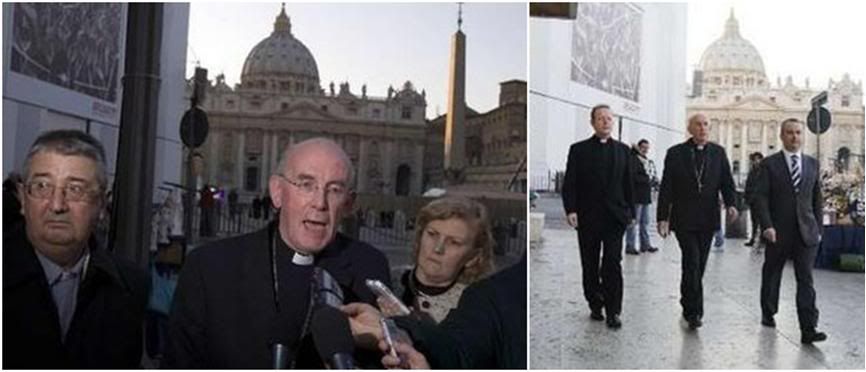
[Modificato da TERESA BENEDETTA 11/12/2009 18:51] |
| |
 11/12/2009 16:39 11/12/2009 16:39 |
|
| | | OFFLINE | | Post: 19.056
Post: 1.703 | Registrato il: 28/08/2005
Registrato il: 20/01/2009 | Administratore | Utente Veteran | |
|

 PAPAL AUDIENCE FOR
PAPAL AUDIENCE FOR
THE PRESIDENT OF VIETNAM
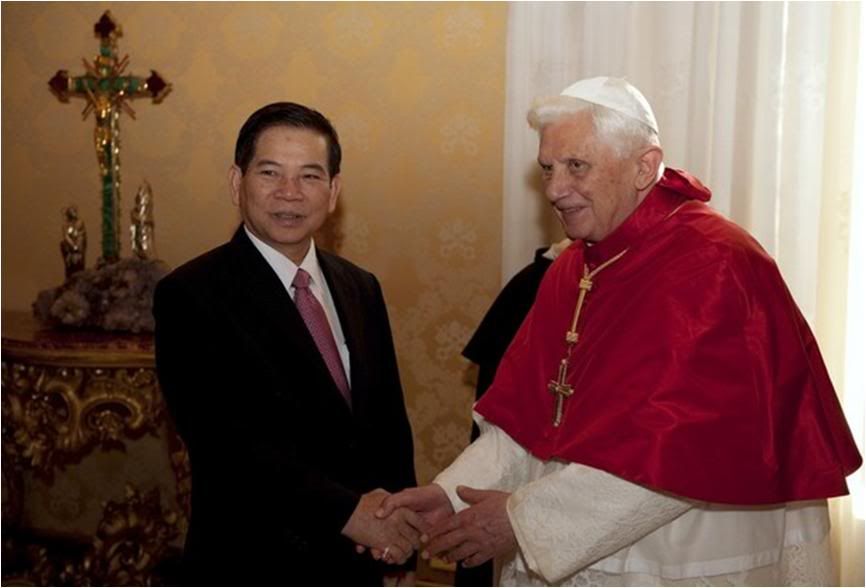
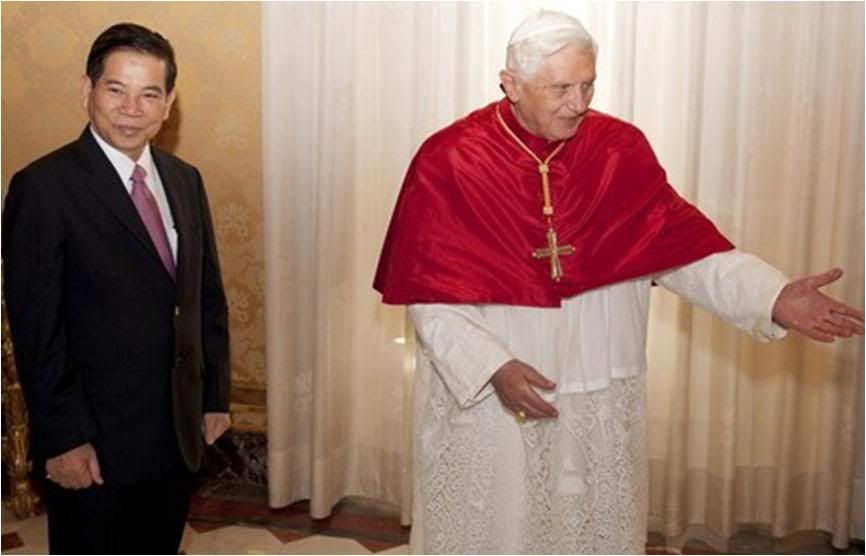
COMMUNIQUE
 This morning the Holy Father Benedict XVI received in audience Nguyen Minh Triet, president of the Socialist Republic of Vietnam.
This morning the Holy Father Benedict XVI received in audience Nguyen Minh Triet, president of the Socialist Republic of Vietnam.
The president subsequently went on to meet with Cardinal Secretary of State Tarcisio Bertone S.D.B. who was accompanied by Archbishop Dominique Mamberti, secretary for Relations with States.
This was the first meeting of a president of the Socialist Republic of Vietnam with His Holiness and with high-ranking officials of the Secretariat of State.
The Holy See expressed its pleasure at the visit, a significant stage in the progress of bilateral relations with Vietnam, and expressed the hope that outstanding questions may be resolved as soon as possible.
The cordial discussions provided an opportunity to touch upon certain themes concerning co-operation between Church and State, also in the light of the Message the Holy Father sent to the Church in Vietnam for the opening of the current Jubilee Year.
Attention likewise turned to the current international situation, with particular reference to the commitment of Vietnam and of the Holy See in the multilateral field.
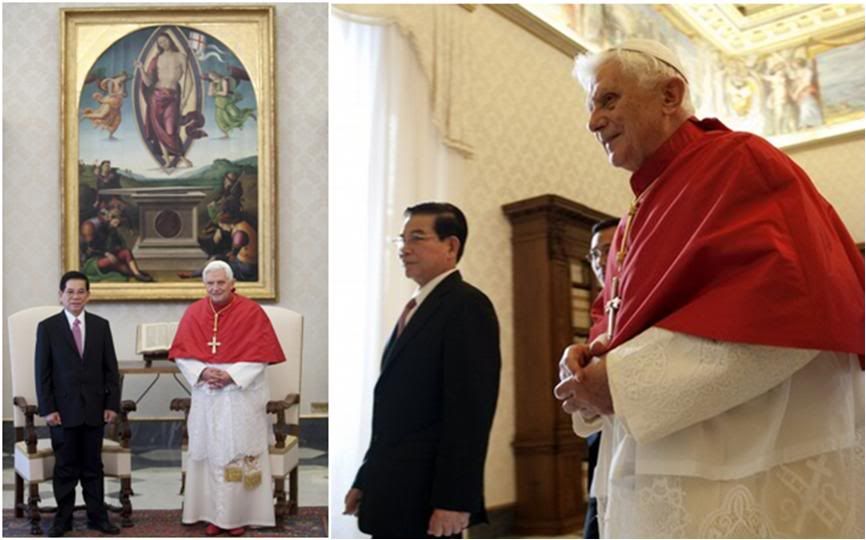 Pope and Vietnam's President meet
Pope and Vietnam's President meet
to set the stage for closer ties

VATICAN CITY. Dec. 11 (AP) — The Vatican called a meeting between Pope Benedict XVI and the president of Vietnam on Friday "a significant stage" in efforts for closer ties between the communist country and the Holy See.
President Nguyen Minh Triet met with Benedict for 40 minutes — twice as long as was scheduled, and the first time that a Vietnamese head of state has met with the pope since the Communists took power in 1954.
On the eve of the trip, Triet had told an Italian newspaper that his government is working to open diplomatic relations with the Vatican. Vietnam's 6 million Roman Catholics is one of the largest Catholic communities in Asia.
"The Holy See expressed its pleasure at the visit, a significant stage in the progress of bilateral relations, and expressed the hope that outstanding questions may be resolved as soon as possible," the Vatican statement said.
There have been tensions between Catholics and the Hanoi government over church property seized by the Communists. The government also closely monitors religious groups and insists on approving most church appointments.
The Vatican said "the cordial discussions provided an opportunity to touch upon certain themes concerning cooperation between church and state," but the statement did not elaborate.
When the meeting was opened to reporters, both men seemed pleased with the discussions.
In his interview published Tuesday in Corriere della Sera, Triet described himself as an atheist but said he goes to churches and pagodas because "I recognize the cultural value" of religious feasts.
Church officials have spoken about the possibility of a papal visit to Vietnam, but the Vatican statement did not mention such a trip.
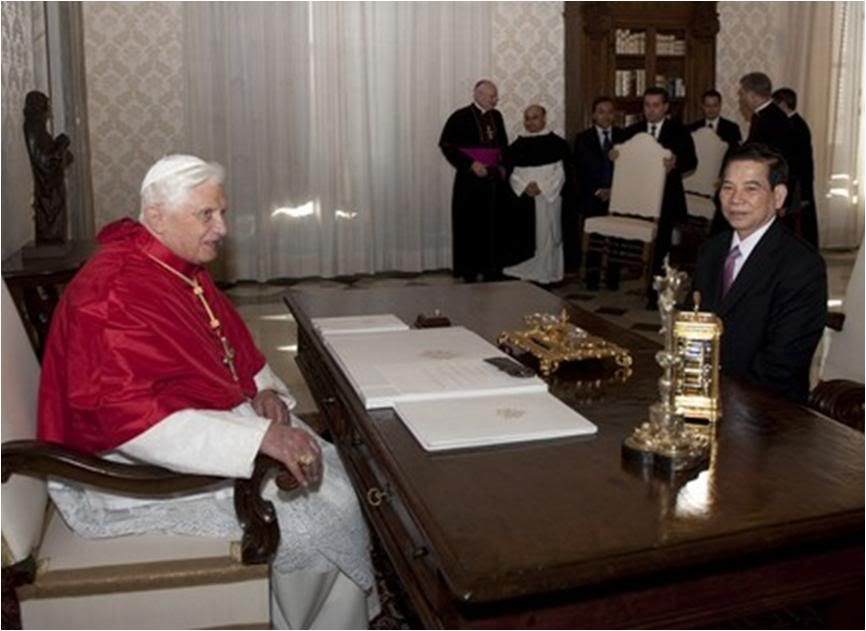 Pope has 'long talk'
Pope has 'long talk'
with Vietnam's President

Vatican City, Dec. 11 (dpa) - Pope Benedict XVI on Friday received Vietnamese President Nguyen Minh Triet, in a meeting which could pave the way for diplomatic relations between the Vatican and the Communist South-East Asian nation.
The two leaders, accompanied by interpreters, met for around 40 minutes at the Pontiff's Vatican Apostolic Palace residence, the ANSA news agency reported.
At the end of their talks they exchanged gifts, with the Vietnamese President presenting Benedict with a silk cloth and the pontiff giving his guest a medallion commemorating his pontificate.
On the eve of the trip, Triet had told an Italian newspaper that his government is working to open diplomatic relations with the Vatican.
Vietnam's 6 million Roman Catholics are the second largest Catholic community in Asia after the one in the Philippines [ which has about 65 million Catholics].
In 2008, Catholics held prayer vigils and protests over land parcels in Hanoi the church says were illegally seized from it by the Communist authorities.
Some observers believe the Vatican intervened to mediate an end to the demonstrations after several of the protestors were arrested.
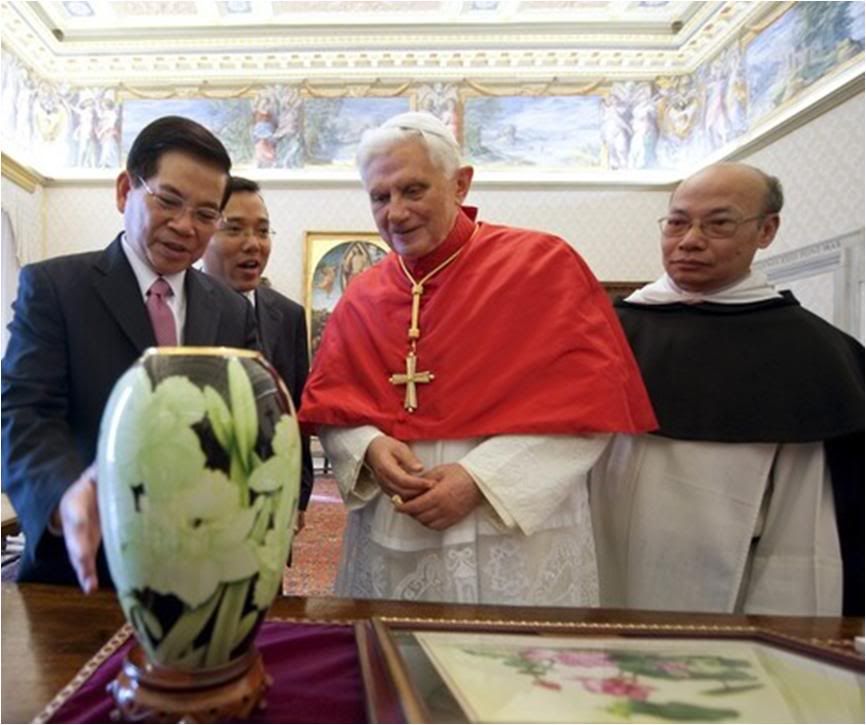
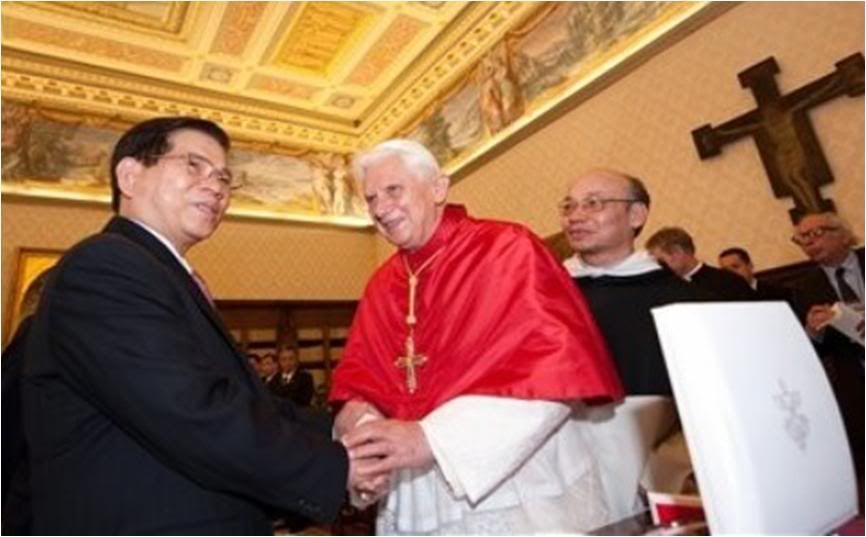
 The Vatican and Vietnam:
The Vatican and Vietnam:
'Two families in a global village':
Interview with Archbishop of Saigon

Ho Chi Minh City, Dec. 11 (Agenzia Fides) - The Pope and the President of Vietnam are like "two fathers in a village," who meet to "ensure concord, peace, truth, and love in the village." The global village of today is the world.
Using this metaphor, Cardinal Jean-Baptiste Pham Minh Man, Archbishop of Ho Chi Minh City (formerly Saigon), in an interview with Agenzia Fides, describes his feelings and hopes on the eve of the meeting between Benedict XVI and President Nguyen Minh-Triet today at the Vatican.
What are your impressions on the upcoming meeting between the Pope and the President of Vietnam?
In a time of globalization, the world has shrunk, transforming itself into a village where nations have become families living for one another and dependent on each other. And, according to the cultural tradition of Vietnam, families, in relationships among them, are like a village.
By this metaphor I want to emphasize that the Vatican and Vietnam seem to have the will to build relations of this type. I hope that the current situation and the meeting between the Pope and the President, that potentially holds advantages for both parties, will bring about such relationships.
How would you analyze current relations between the Vatican and Vietnam, and in the future?
I think in any kind of relationship there may be points of disagreement. But I hope that, through dialogue, mutual respect, and seeking the truth, that step by step the two sides can reach a better understanding and, together, overcome the points of disagreement, in a spirit of "village harmony.”
As the Church in Vietnam, we try to do our part in this journey. For example, after a long work of translation into Vietnamese, on December 4 we were able to distribute the Encyclical of Pope Benedict XVI Caritas in veritate in this country and among civilian authorities. It is a gesture which we hope will contribute to a better understanding of what the Church is and the spirit in which she operates.
How is the Catholic community in Vietnam experiencing this historic meeting?
The Catholic community in Vietnam, from a general point of view, hopes that the "leaders of the two families of the global village" sympathize with each other and together create an atmosphere of harmony for all the families in the village, joining forces to ensure a comprehensive development for the whole community.
They all want to make sure that the "village" will become a new human community where truth, love, justice, and peace prevail.
[Modificato da TERESA BENEDETTA 11/12/2009 18:19] |
| |
 11/12/2009 16:50 11/12/2009 16:50 |
|
| | | OFFLINE | | Post: 19.057
Post: 1.704 | Registrato il: 28/08/2005
Registrato il: 20/01/2009 | Administratore | Utente Veteran | |
|

 Missed seeing this major story yesterday.
First details on Pope's
Missed seeing this major story yesterday.
First details on Pope's
state visit to the UK
in September 2010
By Simon Caldwell

10 December 2009
Pope Benedict XVI will preach to Members of Parliament (MPs) and peers in Westminster Hall when he visits England next September, Vatican sources said today.
He will make an address from the spot where Sir Thomas More was condemned to death in 1535 for opposing the adultery of King Henry VIII.
Details of the four-day state visit are being negotiated in Rome between a delegation of Whitehall officials and their Vatican counterparts. A Vatican delegation has also visited London in an attempt to finalise the plans.
It is understood that the visit will begin on 16 September and that it will end after the Pope has personally presided over the beatification of Cardinal John Henry Newman, possibly in Wembley Stadium, on Sunday 19 September.
The Pope will also address academics at Oxford University.
The former Tory minister Ann Widdecombe, a convert to Catholicism who will be standing down at the general election, said it was “marvellous” that the Pope will be able to address parliamentarians from such a historic venue.
She added: “He should remind parliamentarians of their duty to guarantee freedom and democracy and that includes Christians.”
Westminster Hall was built in the 11th century and is the oldest part of the Palace of Westminster. It is sacred to many Catholics because it was where many martyrs and saints were tried for high treason during the Protestant Reformation.
Most notably it was the scene of the trial of Thomas More, the Lord Chancellor who was beheaded after he refused to take an oath attached to the Act of Supremacy that made the king the supreme head of the Church in England.
He was canonised as a saint by Pope Pius XI in 1935 and made patron saint of politicians by Pope John Paul II. A plaque marking the trial site was kissed by Mother Teresa of Calcutta on one of her visits to Britain.
During the Elizabethan era, St Edmund Campion, the Jesuit missionary, was also tried in the hall and, in the reign on James I, it was the setting for the trial of Guy Fawkes, who had tried to blow up the building in the Gunpowder Plot of 1605.
In the same century, dozens of innocent Catholic priests falsely accused by Titus Oates of plotting to kill King Charles II and put his Catholic brother James on the throne were tried and sentenced to death there. Samuel Pepys, the diarist and naval administrator, was implicated in the plot, and also tried but was acquitted.
Monsignor Anthony Stark, master of the Guild of Our Lady of Ransom, a Catholic society set up to pray for the conversion of England, and who has led pilgrimages to Westminster Hall, said it was “wonderful” that Pope Benedict would be speaking from the spot where Thomas More was condemned to death.
“The Holy Father will reflect his own thoughts on the significance of this,” said Monsignor Stark.
“His appreciation of their stand and their condemnation in that place will be more than other Popes. He is an historical theologian and he will speak with great insight and I am sure his words will be heeded by many.”
It is being rumoured in Rome that Pope Benedict is likely to use his Westminster Hall speech to address the subject of religious freedom at a time when Christianity is under pressure in the western world from aggressive secularism.
However, the occasion will signify a great personal achievement by a Pope who is known to have a lifetime devotion both to Thomas More and to Cardinal Newman.
Benedict XVI is considered by theologians as one of the Church’s most authentic interpreters of Newman’s “theology of conscience” and he has publicly compared Newman’s teachings to the stance of Thomas More in defying Henry VIII.
Newman’s life and work, he said in a speech, “could be designated a single great commentary on the question of conscience” and that along with St Thomas More, Newman is Britain’s other “great witness of conscience”.
Monks led by St John Houghton, the Abbot of the London Charterhouse, became the first martyrs of the Protestant Reformation after they were condemned to death in the Great Hall and then hanged drawn and quartered at Tyburn on 4 May 1535.
St John Fisher, the Bishop of Rochester canonised at the same time as More, was tried and condemned in the Hall and then beheaded on Tower Hill on 22 June 1535 – two weeks before More met the same fate.
The transcript of More’s trial in the Hall still exists, including his final testimony after he was condemned to death.
He told the court that it was not so much for the Act of Supremacy “that you seek my blood as for that I would not condescend to the marriage” (between Henry and Ann Boleyn), which he considered to be adulterous.
An official announcement of the papal visit is not expected until well into the new year.
Another story from a local newspaper in Oxfordshire:
Pope 'to visit Oxford in September'
6:30am Thursday 10th December 2009
By Reg Little

Dec. 10, 2009
POPE Benedict XVI is set to visit Oxford next September, it is being reported.
With the Vatican still in discussions with Whitehall officials about the details of next year’s papal visit, there has as yet been no official confirmation from Rome that Pope Benedict will be coming to the UK.
But latest reports suggest the Pope will be coming to Oxford between September 16 and 19, when it is believed he will address Oxford University academics.
It is also thought that he will visit at least one site in or around the city associated with Cardinal Newman, the revered Catholic thinker who had been Anglican vicar of the University Church of St Mary the Virgin in High Street.
Pope Benedict’s visit seems certain to coincide with the beatification of Cardinal Newman.
The Pope is known to have been an admirer of Newman’s writings over many years and may wish to personally oversee the beatification.
The visit would make Pope Benedict the first Pontiff in history to visit Oxford, with the provisional itinerary also expected to include an address to MPs in Westminster Hall, where Catholic martyrs including Sir Thomas More were condemned to die.
An official announcement of the visit is not expected until well into the new year. But in September Government sources leaked documents about the proposed visit, with Oxford featured in the draft itinerary.
[Modificato da TERESA BENEDETTA 13/12/2009 18:31] |
| |
 12/12/2009 02:41 12/12/2009 02:41 |
|
| | | OFFLINE | | Post: 19.058
Post: 1.705 | Registrato il: 28/08/2005
Registrato il: 20/01/2009 | Administratore | Utente Veteran | |
|


 Here is Sandro Magister's belated report on the book of essays on Europe and its perils by Cardinal Ratzinger/Benedict XVI published by the Russian Orthodox Church in a bilingual Italian-Russian edition, as reported by ZENIT and posted on Page 47 of this thread last December 1.
benedettoxviforum.freeforumzone.leonardo.it/discussione.aspx?idd=8527...
A new spring for Rome and Moscow
Here is Sandro Magister's belated report on the book of essays on Europe and its perils by Cardinal Ratzinger/Benedict XVI published by the Russian Orthodox Church in a bilingual Italian-Russian edition, as reported by ZENIT and posted on Page 47 of this thread last December 1.
benedettoxviforum.freeforumzone.leonardo.it/discussione.aspx?idd=8527...
A new spring for Rome and Moscow
For the first time, the Russian Orthodox Church has published a book with texts by a Pope -
Benedict XVI. The topic is Europe.
The objective is a holy alliance in defense of the Christian Tradition.

ROME, December 11, 2009 – In a terse statement two days ago, Russia and the Church of Rome announced "the establishment of diplomatic relations between them, at the level of apostolic nunciature on the part of the Holy See, and of embassy on the part of the Russian Federation."
Six days earlier, on December 3, Pope Benedict XVI had received in audience Dmitri Medvedev, president of the Russian Federation, to whom he had given a Russian-language copy of the encyclical "Caritas in Veritate," and with whom he had discussed "cultural and social topics of common interest, like the value of the family and the contribution of believers to the life of Russia."
But it is not only with the authorities of the Russian state that the Church of Rome now has relations defined by both sides as "friendly." There appears to be a new springtime, too, in relations with the Russian Orthodox Church and its 'Vatican' - the Patriarchate of Moscow.
One signal of this came at the same time as Medvedev's visit to Italy. A book was presented in Rome on December 2, published by the patriarchate of Moscow and containing the main speeches about Europe made over the past ten years by Joseph Ratzinger, as cardinal and Pope.
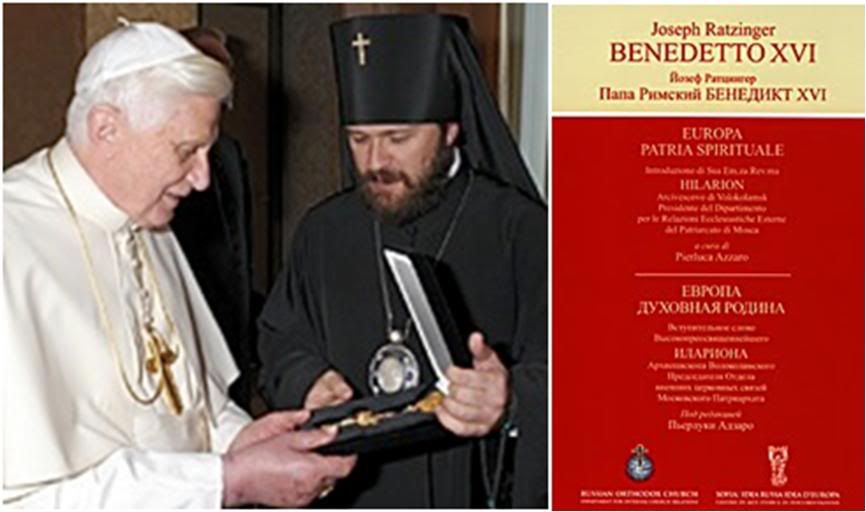 Left photo was taken during Archbishop Hilarion's visit to the Vatican last month. Right, the bilingual book. Interesting note: the byline in Russian is Joseph Ratzinger/Papa Riomskii [Pope of Rome] Benedict XVI.
Left photo was taken during Archbishop Hilarion's visit to the Vatican last month. Right, the bilingual book. Interesting note: the byline in Russian is Joseph Ratzinger/Papa Riomskii [Pope of Rome] Benedict XVI.
The volume is bilingual in Italian and Russian. The title is taken from an expression that Benedict XVI used in Prague: "Europa, patria spirituale [Europe, spiritual homeland]." And its extensive introduction is signed by the president of the patriarchate's department for external Church relations, Archbishop Hilarion of Volokolamsk, an authority of the highest order.
Suffice it to say that the previous occupant of this post, Kirill, is today the Patriarch of the Orthodox Church of Moscow "and all Rus."
An extract from the introduction to the book is reproduced further below. It is of great interest for grasping the perspective from which the patriarchate of Moscow looks at its own role in Europe.
It is a Europe forged by Christianity, but now attacked by a "militant secularism" against which two forces above all are leading the counteroffensive: the Church of Rome in the West, and the Orthodox Church in the East.
Those who expect an Orthodox Church removed from time, made up only of remote traditions and archaic liturgies, will come away shaken from reading the introduction to this book.
[Having translated the entire lengthy introduction by Hilarion, 'shaken' seems rather inappropriate. Better-informed, yes, because Hilarion writes an effective and concise exposition of the history of the Russian Church since the Russian Revolution of 1917 to the present. We do not generally get to read much about what the Church of Russia is doing internally, but Hilarion tells a gripping story from the inside.
But 'shaken', no! Because the Patriarchate of Moscow has nonetheless been quite active in its PR work within Europe - much of it Kirill's work when he was the 'foreign minister' - making clear its positions on Europe's runaway secularization regularly and even relentlessly.]
The guideline here is being set by a document of great vigor, unprecedented in the entire history of Orthodoxy. Its title is: "The foundations of the social doctrine of the Russian Orthodox Church," and was published by the council of Russian bishops in 2000.
The image that emerges from it is that of a Russian Orthodox Church that refuses to let itself be locked up in a ghetto, but on the contrary hurls itself against the secularist onslaught with all the peaceful weapons at its disposal, not excluding civil disobedience against laws "that oblige the commission of a sin in the eyes of God."
[There seems to be some confusion here. Hilarion cites the social doctrine document not as part of his historical overview, but to define the relationship of the Russian Church to modern society - like a Russian Gaudium et spes - but more concrete in specifying how it proposes to counteract secularization by upholding and promoting the Christian tradition. Hilarion's entire essay is entitled 'Europe and the intimidations of secularism'.]
It is a text that is also striking for its frank, politically incorrect language, unusual for the pen of a high Church authority.
But before reading it, it is interesting to take note of a few of the book's unique features.
Its publication is not the result of official ecumenical contacts. Neither the Pontifical Council for Christian Unity headed by Cardinal Walter Kasper nor any other Vatican office had anything to do with it.
The actual organizers and publishers are the department for external Church relations of the patriarchate of Moscow and a Rome-based asscoation called Sofia, which promotes "Idea Russa, Idea d’Europa."
This association is run by Pierluca Azzaro, a professor of the history of political thought at the Catholic University of the Sacred Heart, who also edited the book. And he acts through the "Foro di dialogo delle società civili di Italia e di Russia," whose co-presidents are Luisa Todini, CEO of a big construction company and former European Parliament member in the party of Silvio Berlusconi; and Vladimir A. Dmitriev, chairman of Vnesheconombank.
The Forum was created at the end of 2004, through the joint initiative of Berlusconi and Russian president Vladimir Putin. [The Forum is a project of the Russian-Italian friendship society, which holds it in Rome or Moscow during the bi-annual meetingsd between their heads of government held alternately in their respective capitals.]
It was this Forum that organized the public presentation in Rome last December 2 of the book by Joseph Ratzinger/Benedict XVI, at the offices of the Ministry for Economic Development, with the participation of two other ministers, for culture and for education, and a sizable crowd of businessmen, diplomats, experts in geopolitics.
The speaker representing the Russian cultural world was the rector of the Moscow State Institute of International Relations, Anatoly V. Torkunov, and for the world of Italian culture, the rector of the Catholic University of the Sacred Heart, Lorenzo Ornaghi.
For the Patriarchate of Moscow, there was the secretary of the department for external Church relations, Sergij Zvonarev, while for the pontifical council for Christian unity there was Monsignor Milan Zust, a specialist on relations with Orthodoxy.
The title of the meeting was: "The role of the Churches in the cultural integration of Europe."
[Magister then posts an English translation of excerpts
chiesa.espresso.repubblica.it/articolo/1341357?eng=y
from Hilarion's lengthy Introduction to the book, published in Italian by L'Osservatore Romano on December 2.
I posted a full translation in Page 3 of the ISSUES thread on Dec. 3,
benedettoxviforum.freeforumzone.leonardo.it/discussione.aspx?idd=872...
because as excellent as Hilarion's Introduction is, it said not a word about Cardinal Ratzinger, Benedict XVI, nor the book it purports to introduce!
I am surprised that no one so far, not even Magister, has pointed out this very obvious omission - they're all too polite. But to my mind, it is a rank discourtesy. As I commented earlier, what would it have cost Hilarion to add just one sentence, at least, to tie up everything he wrote to the positions expressed by Benedict XVI in the book? I'm also surprised the ubiquitous John Allen has not commented on this story at all.?]
[Modificato da TERESA BENEDETTA 15/12/2009 00:55] |
| |
 12/12/2009 13:55 12/12/2009 13:55 |
|
| | | OFFLINE | | Post: 19.059
Post: 1.706 | Registrato il: 28/08/2005
Registrato il: 20/01/2009 | Administratore | Utente Veteran | |
|

 It's very frustrating when one sees interesting stories cited from L'Osservatore Romano which are not among those that the OR itself chooses to post online. In the Dec. 11 issue, it was the story about the 'white blackbird' that caught the eye of Benedict XVI - and was eventually caught on camera by Mons. Xuereb, one of the Pope's secretaries. Lella carried the story and at least one photo of the bird on her blog. And from the Dec. 12 issue, this story retold in Petrus.
Al-Jazeera is filming a TV documentary
It's very frustrating when one sees interesting stories cited from L'Osservatore Romano which are not among those that the OR itself chooses to post online. In the Dec. 11 issue, it was the story about the 'white blackbird' that caught the eye of Benedict XVI - and was eventually caught on camera by Mons. Xuereb, one of the Pope's secretaries. Lella carried the story and at least one photo of the bird on her blog. And from the Dec. 12 issue, this story retold in Petrus.
Al-Jazeera is filming a TV documentary
on the Church and the Pope to be aired next June

VATICAN CITY, Dec. 11 - The Arab television outlet Al-Jazeera will air a documentary on the Church and the Pope next June, according to one of their journalists who has started filming at the Vatican.
Mohamed Kanawi told L'Osservatore Romano that the purpose was "to make the Arab and Muslim world learn about a universal reality like the Catholic Church", and in particular, the figure of the Pope "who is both a spiritual leader and a chief of State".
Earlier, Kenawi filmed a 20-minute-long interview with Cardinal Tarcisio Bertone, the first one done by Arab TV with a high-ranking Catholic prelate.
L'Osservatore says the whole Al-Jazeera project was originally presented to and eventually developed with the Pontifical Council on Social Communications under Archbishop Claudio Maria Celli.
The documentary will also include an interview with Cardinal Jean Louis Tauran, president of the Pontifical Council for Inter-Religious Dialog; Mons. Gianfranco Ravasi, president of the Pontifical Council for Culture, Mons. Rino Fisichella, president of the Pontifical Academy for Life; and Archbishop Celli himself.
Kenawi said he had been "very impressed by the positive welcome that our initiative received at the Vatican".
In the interview Bertone gave Kenawi, the Secretary of State underscored the openness of the Holy See to dialog with other religions, particularly Islam, and called for peaceful coexistence among Muslims and Christians, saying that the Catholic Church defends 'the rights of all men".
There was an item about Bertone's interview earlier this week that I 'marked' for translation but didn't get around to - I have to check it back.
[Modificato da TERESA BENEDETTA 15/12/2009 18:58] |
| |
 12/12/2009 15:37 12/12/2009 15:37 |
|
| | | OFFLINE | | Post: 19.060
Post: 1.707 | Registrato il: 28/08/2005
Registrato il: 20/01/2009 | Administratore | Utente Veteran | |
|
 Saturday, December 12
Saturday, December 12
 Images from left: Apparition to Juan Diego; the miraculous image on the tilma; etching of Juan and the cloak; 18th-cent painting "God painting the image of Guadalupe'; battle standard of General Miguel de Hidalgo in the Mexican War for Independence; and Juan Diego's tilma with the image, venerated in the Basilica of Guadalupe.
NUESTRA SENORA DE GUADALUPE, 'Queen of Mexico', Patroness of the Americas
Images from left: Apparition to Juan Diego; the miraculous image on the tilma; etching of Juan and the cloak; 18th-cent painting "God painting the image of Guadalupe'; battle standard of General Miguel de Hidalgo in the Mexican War for Independence; and Juan Diego's tilma with the image, venerated in the Basilica of Guadalupe.
NUESTRA SENORA DE GUADALUPE, 'Queen of Mexico', Patroness of the Americas
December 12 commemorates the day when the image now venerated as Our Lady of Guadalupe appeared miraculously on the cloak of the man who is now St. Juan Diego, remembered by the Church on December 9, the date of the Lady's first apparition to him on Tepeyac hill (part of what is now Mexico City), bidding him to tell the bishop to build a church in her honor. The skeptical bishop asked for a sign, and Juan Diego returned to Tepeyac to intercede for a sick uncle and convey the bishop's reaction. The Virgin told him his uncle would recover and asked him to gather roses on the hilltop to bring to the bishop. Juan wrapped the miraculous roses in his cloak and when he opened it for the bishop, the cloak itself was found to carry the image of the Lady who had appeared to him. The initial surge of popular devotion and conversions to Catholicism inspired by the miracles, coinciding with the early years of the Protestant Reformation in Europe, grew to be the most popular devotion in all Latin America and perhaps the world. Millions of faithful visit the Shrine of Guadalupe on the two days of spiritual celebrations Dec. 11-12 dedicated to Our Lady.
OR today.
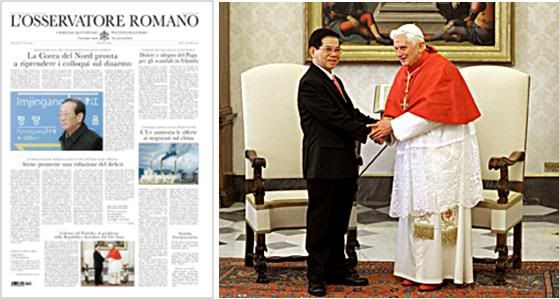 Papal stories on Page 1: The Pope's sorrow and shame for the child abuse and clergy cover-up in Ireland,
Papal stories on Page 1: The Pope's sorrow and shame for the child abuse and clergy cover-up in Ireland,
and his audience with the President of Vietnam. Other Page 1 stories: North Korea once again claims to be
ready to resume nuclear disarmament talks; Greek government promises European Union it will reduce
its deficit, as the country's loses credit rating; and the draft of a consensus on climate change presented
in Copenhagen.
THE POPE'S DAY
The Holy Father met today with
- H.E. Sali Berisha, Prime Minister of Albania, with his wife and delegation
- Cardinal Vinko Puljić, Archbishop of Vrhbosna-Sarajevo (Bosnia ed Herzegovina)
- Mons. Reinhard Marx, Archbishop of Munich and Freising
- Mons. Giacinto Berloco, Apostolic Nuncio in Belgium and Luxembourg
And in teh afternoon:
- Cardinal Giovanni Battista Re, Prefect of the Congregation for Bishops.
|
| |
 12/12/2009 16:45 12/12/2009 16:45 |
|
| | | OFFLINE | | Post: 19.061
Post: 1.708 | Registrato il: 28/08/2005
Registrato il: 20/01/2009 | Administratore | Utente Veteran | |
|
 The Holy Father is the subject of a cover story in the December 2009-January 2010 issue of The American Spectator,
The Holy Father is the subject of a cover story in the December 2009-January 2010 issue of The American Spectator,
an opinion magazine founded in 1924 that is aimed at 'young conservatives'..
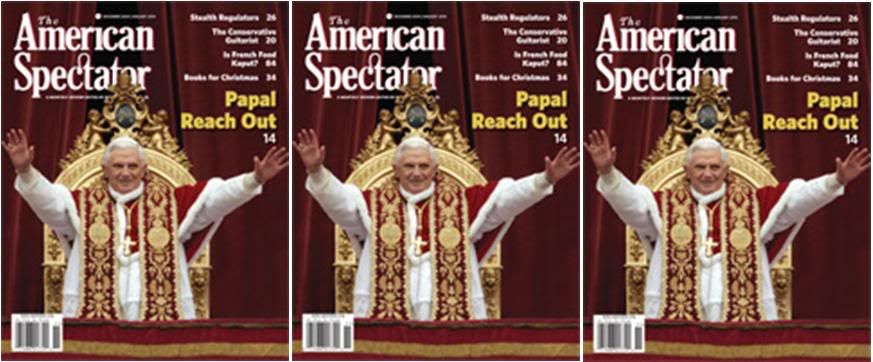 From the two-line backgrounder provided about the author, Jeremy Lott, this article appears to have been written from a secular point of view by a secular author, which probably explains a few misrepresentations. Nonetheless, a very good appreciation of Benedict XVI nearing completion of the first five years of his Pontificate.
Benedict XVI:
From the two-line backgrounder provided about the author, Jeremy Lott, this article appears to have been written from a secular point of view by a secular author, which probably explains a few misrepresentations. Nonetheless, a very good appreciation of Benedict XVI nearing completion of the first five years of his Pontificate.
Benedict XVI:
The 'Great Consolidator'
By Jeremy Lott
from the Dec 2009-Jan 2010 issue of

For all the Sturm und Drang that rolled off the British newspaper presses in late October, you'd think the Limey scribblers were sounding the alarm over an imminent threat to the realm rather than reporting on a pair of religion news conferences.
It was as if the bishop of Rome had scrambled a new Spanish Armada and personally set sail for Canterbury -- guns at the ready, popemobile retrofitted for a water landing.
"An Unholy Battle for the Market Share of Our Souls". complained the normally pro-market Financial Times.
"Pope Benedict Opens New Front in Battle for the Soul of Two Churches", observed the Observer.
"Desperate Bishops Invited Rome to Park Its Tanks on Archbishop's Lawn", said those crack armchair generals at the Times of London.
It's all about "Un-leashing the Counter-Reformation", figured the Economist.
"Former Archbishop Attacks Pope for Anglican Overtures" whinged the Independent.
"The End of the Anglican Communion" was ominously announced by the Guardian.
But not to worry, old boy, said the Telegraph, "The Queen Will Stand Up to Pope Benedict" .
What really happened, on October 20, is that the Vatican...made an announcement.
Nothing changed immediately; nobody was hired, fired, promoted, pilloried, or even excommunicated; and no new dogmas were propounded. It's not clear that any change whatsoever will have been undertaken by press time, because Rome's gears do grind slowly.
But the world moved that day because the Vatican let us all in, with press conferences in both Vatican City and London, on the broad outline of its thinking about what to do with the great number of conservative Anglicans who no longer feel at home in their own church.
Cardinal William Levada, head of the Congregation for the Doctrine of the Faith (CDF), said that there were still a few details to be hammered out but here's the short of it: Anglicans and Episcopalians will be allowed to convert en masse, if they so desire. The Catholic Church will also set up a special governance structure so that the newcomers can retain most of those things that they deem distinctive, and so that Anglican and Episcopal clerics don't get the short end of the shepherd's crook.
(Married priests will be able to retain their titles, duties, and congregations. Because the new Anglican Apostolic Constitution will pattern things after the flat organizational structure of the military chaplaincy, married bishops will lose their titles but still retain much of their authority, and married priests will be able to be promoted to these not-quite-bishop positions.)
Levada talked a lot about "cultural diversity" and the Anglican "faith journey." When that failed to do the job, he quoted Scripture. The cardinal provided historic context for this decision by saying that the "many diverse traditions present in the Catholic Church today are all rooted in the principle articulated by Saint Paul in his letter to the Ephesians: ‘There is one Lord, one faith, one baptism.' " And these add up to: one Church.
That was a huge departure from the Vatican bureaucracy's previous stubborn, almost snobbish position on Anglican conversion. In July, the CDF had sent a letter to the conservative Church of England splinter group called the Traditional Anglican Communion, promising to give the proposal for group incorporation "serious attention."
Monsignor Mark Langham of the Pontifical Council for Promoting Christian Unity, which is nominally tasked with overseeing Anglican relations, dismissed it in an AP story as a "standard Vatican holding letter." [Strange reaction, considering that the Traditional Anglican Communion, whose bishops had been conferrring with the CDF, publicized that letter at the time as 'proof' that things were moving forward.]
"Conversion is an individual process, " he sniffed. [If Langhan did make these remarks, he was speaking out of turn, and for himself, not for the Vatican.]
Not anymore, it's not. Several press accounts accused the Pope of "fishing" for converts or attempting to "poach" himself a four-egg Anglican omelet. [But the primary sense of 'poach' as used in this context was fishing in alien waters.]
These stories implied an opportunistic power play, with headlines like "The Pope's Power Grab" and "The Pope's Anglican Blitzkrieg".
More accurate assessments made note of the fact that disaffected parishioners from the Church of England and its various offshoots have been banging on Rome's door for years, trying to get in. Rome finally decided to let them in for some reason.
[The reason being that such an unprecedented move required study! It was no longer just a case of an isolated small parish wanting to cross over, as in a few instances in recent decades. This involved a group as large as the Traditional Anglican Communion composed of dioceses representing at least 400,000 Anglicans around the world. As it is, it only took about 4-5 years since the TAC first formally asked about the possibility. That is 'short' in the context of traditional 'Vatican time' - and no small thanks to Benedict XVI's decisiveness!]
In the American press, the timing of the announcement was mostly reduced to the usual boring cluster of sex-related issues. Rome had moved "quickly," we were told, because conservative Anglicans live in waking fear of female bishops and gay nuptials.
The Vatican would now have to deal with the supposedly explosive issue of married priests, even though Eastern Rite Catholics have had married priests for centuries and married clerics from other Christian communions are grandfathered in when they convert through the so-called "pastor's option."
A little more creativity could have made the accusations so much more damning, or at least interesting. Given the international politics of the Catholic Church, a better reason to finger for the timing would have been the closing of the synod of African Catholic Bishops the same week.
It ended with a message -- aimed at politicians and, indirectly, priests -- to either repent of the ceaseless corruption and change their ways or else resign. There are about 38 million Anglicans on the African continent and the Catholic Church is looking to grow there.
Or, how about sowing the seeds for the grandest of all dramatic papal visits? The Pontiff is scheduled next year to visit the UK for the beatification ceremony -- the first step toward saint-hood -- of the famed Anglican to Catholic convert Cardinal John Henry Newman.
King Henry VIII's break with Rome in the 16th century fractured the Church in the English-speaking world. Imagine the atmospherics of a Pope returning to British soil with hundreds of thousands of Anglicans well along in the process of repairing that old rift, and the old religious establishment straining to deal with the mass exodus. And you thought John Paul II was a rock star.
There is another explanation that cuts to the heart of the issue. Rome is a bureaucracy but it is also a monarchy, and this monarch is of far more than ceremonial importance.
Pope Benedict XVI had heard enough, had made up his mind, and was sick of the delays that accompany the Curia's slow deliberations about vital matters. As David Gardner rightly noted in the Financial Times, the Pope intentionally "side-stepped...the Vatican officials who do ecumenical work" and worked through the CDF, the teaching arm of the Church, which he used to run. [There you are!]
Announcing the Catholic Church's tentative plans in advance would speed up the process and send a message the Pope believes the world needs to hear about the Church.
It's a message that he's been preaching since he was elected Pope in April 2005, but now he has our undivided attention. The Wall Street Journal posed the question: Could this most unlikely man become "The Great Unifier"? ['Most unlikely' depends on how much you know about Joseph Ratzinger/Benedict XVI!]
After Cardinal Joseph Ratzinger's election as the 265th bishop of Rome, most attention focused on his biography and the sharp-edged message that he had delivered to the conclave of cardinals before the vote.
He had been called "God's Rottweiler" as the head of the CDF not because of his personal demeanor -- he rarely snarls -- but because he censured several theologians and priests for heresy. [As he should, because it was his duty in behalf of the Church, not of himself!]
In his message to fellow cardinals at the last Mass before they locked themselves into the Vatican Palace to choose the next Pope, he warned against the "trivialization of evil" that is often promoted by ideological fashions.
In that homily, Ratzinger denounced Marxism, liberalism, libertinism, collectivism, radical individualism, atheism, vague religious mysticism, agnosticism, syncretism, and relativism -- all by name -- and spoke up for what "is often labeled today as fundamentalism".
Liberals inside and outside of the Church tended to take his message as some sort of a personal attack, even though that "radical individualism" bit could have been construed as a dig at political conservatives as well.
Less attention was focused on Benedict's first homily as Pope, at a Mass of the College of Cardinals. He opened with the usual boilerplate. "Catholics cannot but feel encouraged to strive for the full unity for which Christ expressed so ardent a hope," he said.
He promised to be "especially responsible" for promoting that unity. Benedict acknowledged that he had been "entrusted with the task" of strengthening his "brethren" -- a word that is fraught with meaning in ecumenical circles as Rome has taken to referring to non-Catholic Christians as "separated brethren."
Then he said something extraordinary and perhaps unprecedented: "With full awareness...at the beginning of his ministry in the Church of Rome which Peter bathed in his blood, Peter's current Successor" -- that is, I, Pope Benedict XVI -- "takes on as his primary task the duty to work tirelessly to rebuild the full and visible unity of all Christ's followers. This is his ambition, his impelling duty."
These words were brought to my attention by Keith Fournier, an ordained Catholic deacon who enthused on Catholic Online that "What happened [in October] is just the beginning."
The only thing is, it wasn't the beginning. Far from it. The present Pope may not go down as the Great Unifier, exactly. He's likely what people today call "too divisive" to pull that off, and it's hard to see why he would want to.
Benedict knows how to use divisions to great effect. He takes Christ's statement from the Gospel of Matthew, "I did not come to bring peace but a sword," quite seriously.
When a group of traditionalist Episcopalians held a conference in Dallas in 2003 to talk about breaking away from the U.S. Episcopal Church over its increasing liberal drift, then Cardinal Ratzinger sent them a message egging them on.
He assured them of his "heartfelt prayers" and said that the "significance of your meeting is sensed far beyond [Dallas] and even in this city, from which Saint Augustine of Canterbury was sent to confirm and strengthen the preaching of Christ's Gospel in England."
According to Dairmaid MacCulloch, writing in the Guardian, when the delegates heard this, "There was wild applause."
In fact, the Pope's recent actions with the Anglicans mirrored an earlier act of his papacy that was also hugely controversial but that was seen by outsiders mostly as a family squabble with some ugly repercussions.
It involved the Society of Saint Pius X. These were traditionalist Catholic priests who, because of the reforms that followed the Second Vatican Council and especially the de facto suppression of the Latin Mass, formed a rebel sect within the Church.
The Society's late founder, Archbishop Marcel Lefebvre, was eventually excommunicated when the aging prince of the Church ordained four new bishops to continue his work in 1988, in defiance of the explicit orders of John Paul II.
Millions of otherwise loyal Catholics, especially in France, attend the Society's beautiful, ancient Mass because they had a hard time finding it anywhere else.
As head of the CDF, Benedict pleaded with Lefebvre not to ordain more rebel bishops, but didn't succeed. As Pope, he moved to reincorporate the Society into the Church, first, by issuing a universal indult in July 2007 mandating that bishops allow the Latin Mass in their dioceses [an imprecise 'summation' of Summorum Pontificum] and, second, in January 2009, by lifting the excommunications of the four men that Lefebvre ordained bishops.
This wouldn't have raised too many eyebrows outside the Church but for the fact that one of those men, Richard Williamson, turned out to be a Holocaust denier and a 9/11 "truther" conspiracy theorist. [Where did this 9/11 thing come from????]
The press had a field day with that one. But there was another story lurking beneath the obvious scandal. Benedict's Latin Mass decree greatly increased the rights of the faithful against their sometimes imperious bishops. Now, a bishop has to explicitly prohibit the Latin Mass, give a good reason for doing so, and risk losing an appeal to Rome. That ended the need for a Society of Pius X as an outside agitator. [Excellent and original perspective!]
Now, Rome wants more priests trained to perform the Latin Mass, and it wants those parishioners back who had turned to the Society for its ceremony. So it swallowed hard and lifted those excommunications and is in talks to bring the Society's priests back in. If talks stall, expect Benedict to personally intervene.
Or take that other great flashpoint of Benedict's papacy, the speech delivered at his old college, the University of Regensburg, on September 12, 2006.
The line that set the world on fire was Benedict's quotation of Byzantine emperor Manuel II Paleologus, who said, "Show me just what Mohammed brought that was new, and there you will find things only evil and inhuman, such as his command to spread by the sword the faith he preached."
Benedict teed up the quote by warning of its "startling brusqueness...that we find unacceptable" today - he reminded people of that Koran's sura that counsels "there is no compulsion in religion," and he never agreed with Paleologus's assessment ("expressed...so forcefully") of Islam, and he quickly apologized for having caused offense.
That did little to prevent churches from being firebombed in Palestine, a nun being killed in Somalia, Christians being attacked in Iraq, riots from breaking out all over the Middle East, or the militant Muslim group Lashkar-e-Taiba from issuing a fatwa calling on faithful followers of Allah to kill the Pope.
In a direct challenge to these violent Islamists, the Pope then visited Turkey -- a nominally Muslim nation whose entrance into the European Union he had opposed.
Most attention was focused on the Muslim rage that the Pope's quote provoked but very few people stopped to consider what Benedict was doing quoting Paleologus at all. He was the kind of person previous popes would have been wary of, at the very least.
Paleologus, recall, was a Byzantine emperor from well after the Great Schism, and thus Orthodox, and not exactly an exemplar of ecumenism. In good times, Paleologus worked to conquer the Latin part of the old Roman empire, or the Pope's own backyard. In bad times, the emperor was forced to contemplate the nature of Islam, because the Turks packed a pretty good wallop.
As Benedict said, "It was presumably the emperor himself who set down this dialogue [that was quoted], during the siege of Constantinople between 1394 and 1402."
We cannot know all the reasons why Benedict chose to quote that particular authority, but it is consistent with his view of a faith that is beset by constant threats, secular and religious. And it sure didn't hurt Vatican relations with Orthodox churches, which had been icy in the past.
When John Paul II tried to visit Moscow, the Russian Orthodox Church vetoed it. In October, the same month as the Anglican overture, the AP reported that Benedict may soon meet with the Russian Patriarch, and that a papal visit to Moscow in the next few years is likely.
Cardinal Walter Kasper, head of the Pontifical Council for Promoting Christian Unity, said, "We have overcome all the tensions in recent years." Not "some tensions"-- all of them.
The Orthodox would be a tougher nut to crack than disaffected Protestants. The schism is much older and the Orthodox have done a better job with Church governance and holding the line against theological innovation.
Benedict wouldn't dare issue the sort of unilateral open-ended invitation that he did with Anglicans, because it wouldn't work. [And because it is not applicable at all to the Orthodox Church, the result of a Schism far more organic than Henry VII's selfish split with Rome because he wanted an adulterous marriage.]
Yet if he can bring the two ancient churches together, my sense is that he will do nearly anything, including placing new limits on his own powers, including editing the Nicene Creed to remove the so-called filioque clause (which states that the Holy Spirit "proceeds from the Father and the Son"), which drives the Eastern half of the ancient Church to distraction.
[Don't know about that, though! That's far too radical, in both senses - tinkering with a deep-rooted belief and tradition established by various Councils is not something any Pope would do! In any case, the 'filiouque' controversy hasn't been mentioned lately, because right now, the two Churches are starting to grapple with the role of the Pope in a reunified Church, which is probably the most fundamental objection of the separated churches to Roman Catholicism.]
Benedict's consummate insight as Pope seems to be that time has made a lot of old theological differences matter less and brought new ones to the fore. Anglicans used to want Catholic tradition but not the Pope. Now they may need him to hold on to their tradition.
The Orthodox must contend with a demographic decline [not the Russian Orthodox Church, which is by far the heavyweight of Orthodoxy], but wouldn't have to if they grafted themselves onto Rome. Traditionalists wanted iron-clad protection for the Latin Mass, and got it.
His message will not appeal to everyone, as well he knows. In her book Ratzinger's Faith, philosopher and theologian Tracey Rowlands points out how utterly opposed he is to feminism. At some level, he just can't bring himself to take it seriously. [And good for him. Feminism is one of the most unattractive and in many ways, unnecessary, of modern ideologies, because like any ideology, it prefers to deal with extremes and has lost all sense of measure.]
Against calls for female ordination, he "cited the judgment of feminist theologian Elisabeth Schussler-Fiorenza that ‘true feminists' should actually oppose the ordination of women and work to abolish the phenomenon of ordination itself" -- since ordination is a product of patriarchy and thus, by their logic, bad. In other words, good luck with that, ladies.
Benedict thinks that his Church has got the basics all right and that it is well positioned to hold out against current trends and decide, in the fullness of time, whether innovations are wise. He's willing to extend that protection to Christians of other communions, to consolidate the faithful under a rule of faith that is both flexible and at the same time unyielding.
That makes him a conservative but a radical one. The easiest way to change a Church is to drastically change her membership, and that is exactly what the Pope is calling for with his impatient prodding to bring whole communions into the flock.
Yesterday the traditionalists, today the Anglicans, tomorrow the Orthodox, and the day after, oh, let's say the Lutherans. After all, this Pope is from Germany, where there has been centuries of ecumenical spadework, and Lutherans are sacramentally inclined Christians who are currently experiencing tremors over issues of sexuality.
If he succeeds, the moniker that future generations should use for him -- the only really accurate one -- is the Great Consolidator.
Jeremy Lott is editor of the Capital Research Center's Labor Watch and author of The Warm Bucket Brigade: The Story of the American Vice Presidency (Thomas Nelson). He blogs at JeremyLott.net.
[Modificato da TERESA BENEDETTA 12/12/2009 16:47] |
| |
 12/12/2009 18:33 12/12/2009 18:33 |
|
| | | OFFLINE | | Post: 19.064
Post: 1.711 | Registrato il: 28/08/2005
Registrato il: 20/01/2009 | Administratore | Utente Veteran | |
|
 Another event for the Holy Father's Christmas season schedule!
Another event for the Holy Father's Christmas season schedule!
(And there are those who would reproach him for starting Christmas Eve Mass at 10 p.m.!
From all the Italian news agencies today:
Pope will lunch at Sant'Egidio
soup kitchen in Rome on Dec. 27
ROME, Dec. 12 (Translated from various agencies) - The Pope will lunch at the soup kitchen run by the Sant'Egidio Community in Rome on December 27, Fr. Federico Lombardi, Vatican press office director, confirmed today.
"On the Feast of the Holy Family on Sunday, December 27," he said, "the Pope will join the Community of St. Egidio for lunch at their soup kitchen in Trastevere".
Sant'Egidio's soup kitchen on Via Dandolo was opened in 1988 and has since served some 2,500,000 meals to the needy - Italians as well as foreigners.
Sant'Egidio also holds an annual Christmas lunch for the poor at the Church of Santa Maria in Trastevere.
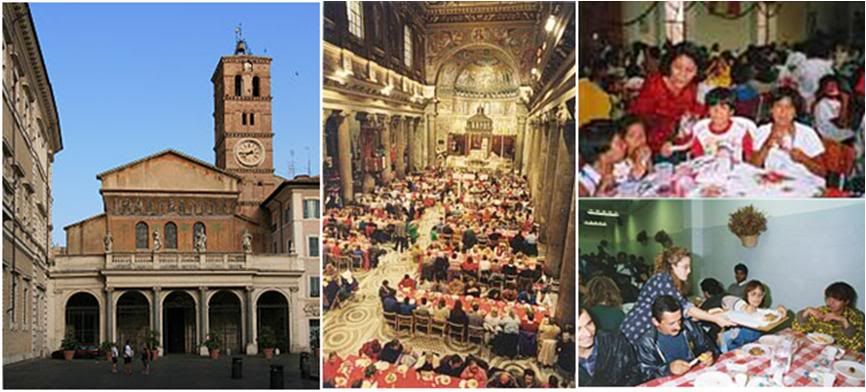 From left, Santa Maria in Trastevere; center and top right: photos from the Christmas lunch of 2008; bottom right, at the Via Dandolo soup kitchen.
From left, Santa Maria in Trastevere; center and top right: photos from the Christmas lunch of 2008; bottom right, at the Via Dandolo soup kitchen.

Tomorrow, the Holy Father will visit a Roman center for terminally ill patients on the Gianicolo [the hill overlooking the Vatican]. which was set up by the Diocese of Rome when palliative treatment for terminally ill patients became a public policy issue in Italy.
And on February 14, he will visit the Caritas hostel for the homeless near Rome's main train station.
Vatican Radio has a report on the Hospice to be visited by the Pope:
Pope to visit hospice
for terminal patients tomorrow
Translated from
the Italian service of

December 12, 2009

Benedict XVI will be visiting the Hospice Sacro Cuore tomorrow at 10 a.m., a center for free palliative care of terminally ill patients that has also become a center for training and research in this area of medicine.
The Hospice counts with many volunteers who offer support and affection for the patients. Many of them are members of the Circolo San Pietro, one of the oldest collaborators of this initiative.
In 2007, when the Pope addressed them at an audience, he thanked them for their "silent but eloquent testimony of love for human life which deserves attention and respect up to the last breath".
Tiziana Campisi spoke to the medical director of the Hospice, Dr. Italo Penco, about hos teh Hospice started.
The Hospice was born at the initiative of Prof. Emmanuele Emanuele, president of what was then the Fondazione Cassa di Risparmio di Roma, now simply called Fondazione Roma, who decided - even before Italian institutions officially began assisting terminal patients - to open an experimental ward to care for terminally ill patients who had no chance of being assisted, least of all with dignity.
In collaboration with the Circolo San Pietro, the facility was set up in a halfway house that had earlier served surgery patients. In 2005, the activity was extended to assist patients who stayed at home. Volunteers of the Circolo have been very active in identifying patients who need this kind of care, especially those who no longer have families.
How does the Circolo help the Hospice now?
Volunteers are considered part of the team that assists our patients, who have multiple needs - physical, psychological, spiritual and the directly symptomatic. The volunteer helps not just the patient but also his family, if there are any. And volunteers who have healthcare training carry out the house calls.
How many persons are being assisted right now?
We have 150 terminally ill - 30 are confined here, and 120 live at home. In 2002, we also started a service for Alzheimer's patients, for whom we also provide home service now to about 50 patients. Last year, we also started helping patients with ALS [amyotrophic lateral sclerosis, also known as Lou Gehrig's disease], of which 3 are confined, and six are home patients. So all in all, Sacro Cuore today has about 220-230 sick people in its care.
What does the visit of Benedict XVI mean to you?
Certainly a signal event that will reinforce and encourage the work we do at the center. For the health care givers, it will be a great support, because psychologically, it is not easy to deal with people who are in the last stage of life. So it will be a stimulus for them to continue their good deeds.
But even more, the Pope's visit will be an occasion for the patients and their families to strengthen that hope which, despite an incurable condition, must always be strong.
The Pope's visit will be confidence-giving for all.
[Modificato da TERESA BENEDETTA 12/12/2009 22:57] |
| |
 12/12/2009 19:39 12/12/2009 19:39 |
|
| | | OFFLINE | | Post: 19.065
Post: 1.712 | Registrato il: 28/08/2005
Registrato il: 20/01/2009 | Administratore | Utente Veteran | |
|


 Damian Thompson could not possibly be more 'expressive' in presenting the unresolvable contradictions within the Anglican Communion which the Archbishop of Caneterbury prefers to downplay, deny or ignore. Thomspon comments in his blog on an interview with Archbishop Williams by the Telegraph's religion editor, published in the newspaper's December 12 issue.
Damian Thompson could not possibly be more 'expressive' in presenting the unresolvable contradictions within the Anglican Communion which the Archbishop of Caneterbury prefers to downplay, deny or ignore. Thomspon comments in his blog on an interview with Archbishop Williams by the Telegraph's religion editor, published in the newspaper's December 12 issue.
First, Thompson's comment- then the article on Williams:
Pope's policies 'theologically eccentric',
says head of blissfully united Anglican Communion

Dec. 12, 2009
So Archbishop Rowan Williams reckons that the Pope’s Apostolic Constitution for ex-Anglicans is “theologically eccentric”. [See article posted below.]
You can see his point. Much better to adopt a clear-cut, rational approach to the problem by allowing parishes to refuse to recognise the orders of the local woman diocesan bishop and neighbouring women vicars by supplying them with the oversight of a male bishop who himself rejects women’s orders but is in full communion with a primate who heads an international communion divided into an inner tier of provinces which obey a moratorium on ordaining gay bishops and an outer tier of provinces not in communion with the inner tier which do ordain gay bishops, both tiers also being internally divided between parishes which do and do not accept women’s orders and also disagree fundamentally on central questions of doctrine such as the nature of Christ’s presence in the eucharist, this difficulty being accommodated by the use of prayer books which contain liturgies that reflect different teachings on the nature of the sacraments and the priesthood, while wider issues of ecclesiology are tackled by herding together the world’s bishops into African tribal meetings called “indabas”.
Nothing eccentric about that, I’m sure you’ll agree.
The article is really about Williams and his problems in the Church of England, and belongs more to NOTABLES, but since he says some pretty significant things about the Pope and Rome, and in the interests of continuity, I am posting it here.
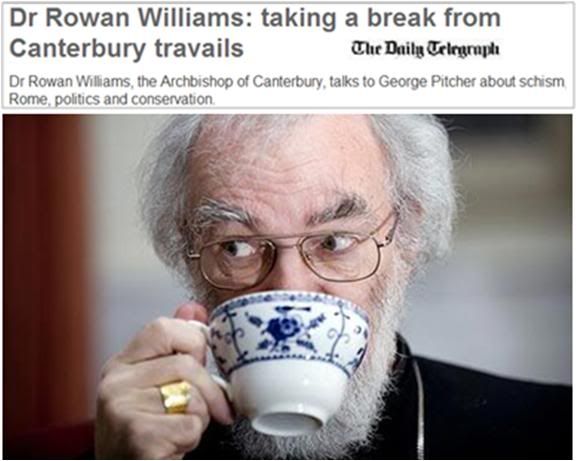
by George Pilcher

Dec. 12, 2009
We’re sitting in the bay window of the 11th-century drawing room of the Archbishop’s Palace in Canterbury. Watching the winter dusk envelop the cathedral, it feels a long way from the pressures of London.
“It is different here,” reflects Dr Rowan Williams. “When people live in human-sized communities, they behave rather more, well, humanly.” He has just greeted the St Nicholas Day procession, and led the motley band into the cathedral, their pagan drumming filling the nave.
He is obviously happy here. In contrast to the critical Lambeth Conference held here last year, he’s clearly tired but not exhausted. “It’s a nourishing place to be,” he agrees.
Then he catches himself, sensing this might sound too much as if it’s all about him: “There’s a lot of deprivation in Kent. Once flourishing communities are now finding it very hard. When I came here, it reminded me of Gwent with an English accent.”
The journey from his native Wales to the See of Canterbury propelled him on to an international stage. Almost exactly concurrent with that teatime in Canterbury, Canon Mary Glasspool was being elected a bishop in Los Angeles, making her the second openly homosexual bishop in the Episcopal Church in America.
Fast-forward a couple of days to the Archbishop’s study at Lambeth Palace, another ancient room but a less tranquil atmosphere. Dr Williams has admonished the Episcopal Church (again) for another provocative act in deepening Anglican schism.
“It confirms the feeling that they’re moving further from the Anglican consensus,” he tells me. Can there ever be a consensus in which biblical traditionalists can be in communion with homosexual bishops? The man who has committed his archbishopric to unity pauses: “I’m not holding my breath.”
On the other side of the schism in Uganda, a private member’s bill has just proposed the death penalty for some homosexuals (now withdrawn), such as those convicted of raping a minor.
And there are those who seek to make a moral equivalence between Los Angeles and Kampala, asking why the Archbishop upbraids the Episcopalians while failing to condemn the Ugandans. Added to which, some American traditionalists have markedly failed to condemn the Ugandan proposals.
“Overall, the proposed legislation is of shocking severity and I can’t see how it could be supported by any Anglican who is committed to what the Communion has said in recent decades,” says Dr Williams. “Apart from invoking the death penalty, it makes pastoral care impossible – it seeks to turn pastors into informers.”
He adds that the Anglican Church in Uganda opposes the death penalty but, tellingly, he notes that its archbishop, Henry Orombi, who boycotted the Lambeth Conference last year, “has not taken a position on this bill”.
With Anglican friends like those in America and Uganda, one wonders whether Dr Williams really needs Pope Benedict XVI, whose surprise new Anglican Ordinariate in October offered a home in Rome for disaffected Anglo-Catholic traditionalists.
Dr Williams declines to be drawn on whether, when he saw him in Rome recently, the Pope was regretful or sorry for effectively jumping him – “private conversation, I think” – but he does concede that the hastily convened press conference, at which he sat uncomfortably alongside the Roman Catholic Archbishop of Westminster, Vincent Nichols, was a big mistake.
“I think everyone on the platform was a bit uncomfortable ... I know the Congregation for the Doctrine of the Faith on the whole doesn’t go in for much consultation – we were just on the receiving end of that.”
Really? Isn’t there something rather acquisitive and invasive about this Pope, who wants us to know that there is one universal voice of authority and it speaks from Rome?
Dr Williams suddenly opens up: “Nothing entirely new about that of course. At the end of John Paul II’s pontificate you have that discussion of how papal authority is meant to be understood, how it might be received by others. I think that’s treading water at the moment. I’d like to see that revived and that’s part of what I was nudging at in Rome.
“Second thing is that in British Catholicism there’s a kind of resurgent – no – recurrent cycle of the 'second spring’, in Cardinal Newman’s imagery, and in the wave of distinguished converts in the interwar years, Evelyn Waugh and so on. There was just a hint of it when Cardinal Hume uncharacteristically talked about the reconversion of England – and I think he regretted that actually.
"And a few people in the last round. It’s a pattern, the sense that the Reformation wounds are going to be healed in favour of Rome. And it just keeps coming back – I think this has been the occasion for another little bit of that. It’s bits of the repertoire.”
The languid manner in which he delivers this leaves no doubt that he’s not holding his breath for a Roman second spring either. I wonder whether the Pope has, unwittingly and ironically, provided the kind of “third province” that Anglo-Catholics were demanding because they can’t accept women bishops, lesbian or otherwise. The Revision Committee for women bishops, after all, dropped proposals for legal protection for them in the wake of the Pope’s initiative.
“I would guess that the papal announcement had some impact on the way some people thought and voted on the committee,” concedes Dr Williams. “But actually I don’t think it is a solution. A great many Anglo-Catholics have good reason for not being Roman Catholics. They don’t believe the Pope is infallible. And that’s why they’re still pressing for a solution in Anglican terms, rather than what many of them see as a theologically rather eccentric option on the Roman side.”
Significantly, he still wants formal protection in the Anglican Church for those who can’t accept women priests. I put it to him that ordained women believe that idea has been thrown out.
“Well, we’ll see,” he responds. “We’re still halfway through our process.”
But whatever the differences with Rome, Dr Williams was anxious to stress that a third round of ecumenical talks, the ARCIC initiative, for next year was nailed down in Rome. He calls that a “small miracle”.
“I think reports of the death of Arcic have been much exaggerated,” says Dr Williams with a rare laugh. “There are a lot of Roman Catholics who want a chance to talk. They need an ecumenical forum to do that.” [Well, talk is cheap, and anyone is free to yammer all he wants. Doesn't mean the Catholic Church will ever relent on women priests and gay marriage!]
This is the internal politics of the Church. What about the more dirty politics across the river from Lambeth? What would he like to see from politicians in the coming general election year?
He responds that we “curiously have three party leaders, all of whom have a very strong moral sense of some spiritual flavour”. David Cameron may have conceded that the Church of England is in his DNA, but Gordon Brown is a son of the manse who is notoriously secretive about his faith or lack of it, and Nick Clegg has declared his atheism. “
But he takes it seriously,” replies Dr Williams. “And with all of them I think if you can get them off the record or off the platform, these convictions will come through quite strongly.”
Is the problem “we don’t do God” spin doctors? “I think it’s important for politicians not to be too protected, to be able to establish their human credentials in front of a living audience.”
So our leaders need to be more open about their faith? “I don’t think it would do any harm at all. Part of establishing their human credentials is saying 'This is where my motivation comes from ... I’m in politics because this is what I believe.’ And that includes religious conviction.
“The trouble with a lot of government initiatives about faith is that they assume it is a problem, it’s an eccentricity, it’s practised by oddities, foreigners and minorities. The effect is to de-normalise faith, to intensify the perception that faith is not part of our bloodstream.”
Between our Canterbury and Lambeth meetings, I attend a Christmas reception at Number 10. The Prime Minister tells us: “I don’t subscribe to the naked society. I don’t subscribe to the secular society.” Perhaps Dr Williams is catching a political second spring.
He seems to want to get stuck into some of those politics. Protecting the rural economy from rapacious supermarket chains is a case in point. And he wants the Church of England to step up to the plate in the rural communities that he has recently been visiting, encouraging the “unsung heroes” in his flock.
He proposes a “supermarkets ombudsman” and reckons the bishops in the House of Lords can and should play a role in establishing the post. “We need more care in holding together the environmental and conservation agenda with the food production agenda in some areas.”
It will be engaging to see what Lord Sainsbury, for one, makes of such proposals from the Lords Spiritual. But nothing will happen, will it, without political, as well as religious, conviction?
“I think we’ve lost a sense of what we really understand by public virtue,” says Dr Williams quietly. “Character is something that has fallen off the radar for quite a lot of people.”
Would he like to hear our political leaders saying something similar from their public pulpits during this last Christmas before the election? The Archbishop of Canterbury is making no political predictions, but smiles: “I’d be very happy if they did, yes.”
P.S. I see Father Z has 'annotated' the Pilcher article on his blog today.
wdtprs.com/blog/
[Modificato da TERESA BENEDETTA 12/12/2009 19:40] |
| |
 12/12/2009 23:40 12/12/2009 23:40 |
|
| | | OFFLINE | | Post: 19.067
Post: 1.714 | Registrato il: 28/08/2005
Registrato il: 20/01/2009 | Administratore | Utente Veteran | |
|

 Here's a belated post reporting something I have not seen elsewhere - though I had wondered why there were really no reports - only photos - about what Archbishops Martin and Brady had told newsmen who besieged them after they emerged from their audience with the Pope yesterday.
Archbishop Martin says
Here's a belated post reporting something I have not seen elsewhere - though I had wondered why there were really no reports - only photos - about what Archbishops Martin and Brady had told newsmen who besieged them after they emerged from their audience with the Pope yesterday.
Archbishop Martin says
pastoral letter to Irish faithful
was entirely the Pope's idea

VATICAN CITY, Dec. 11 (Translated from ASCA) - The idea of writing a pastoral letter to the Catholics of Ireland, shaken by the revelations of the government inquiry on child abuses committed by Irish priests, came directly from Pope Benedict XVI and was not the result of a request by the Irish bishops.
This was stated by Archbishop Darmuid Martin of Dublin, speaking to newsmen who spoke to him and the Archbishop of Armagh, Sean Brady, Primate of Ireland, after their 90-minute meeting with the Pope and leading members of the Roman Curia.
Martin said the letter would probably be ready shortly after the New Year, and anticipated a 'very important reorganization' of the Church in Ireland after this crisis.
An Irish Times article today - which did not make any reference to Martin's comment about the Pope's pastoral letter adds the following information:
Last night the retired professor of moral theology at St Patrick’s College, Maynooth, Dr Vincent Twomey, said it was rare for a Pope to address a local church through a pastoral letter and that it was “very significant”.
Dr Twomey, who was a doctoral student of the Pope for many years at Regensburg University in Germany, said such letters were sent at times “of major crisis for both the Church and the society” to whom they were addressed.
I must confess that because of the precedent of the Pope's pastoral letter to the Catholics of China, I did not appreciate the singular new precedent itself of a pastoral letter to the Irish, as Mons. Twomey points out.
The letter to the Chinese Catholics was historically necessary for obvious reasons - nowhere else in the world today is there a Church divided into 'official' and 'underground', and all Chinese Catholics, whatever side they belong to, needed an authoritative voice speaking to all of them, after more than 50 years of being rudderless and leaderless.
The Church in the United States was shaken to the roots by the scandal of abusive priests and bishops covering up for them, much earlier than the Church of Ireland - and it is still paying for its sins, literally. But the Church in the US did not get a pastoral letter from the Pope - it may have had to do with timing, since the US scandal peaked in the final years of John Paul II's life, when from all accounts, his Polish 'kitchen cabinet' was running the Church administration. [Also, I don't think that in his 26+ years as Pope, John Paul II ever had to write one of these special pastoral letters.]
[For instance, I share the perplexity of many American Catholics that Cardinal Law of Boston, who covered for his erring priests as badly as any of the Irish bishops mentioned in the Ryan and Murphy reports, appeared to have been rewarded by the Vatican by being named Arch-Priest of Santa Maria Maggiore. Assignment to a monastery or a foreign mission might have been more appropriate.]
But Benedict XVI is able to use every tool available to a Pope to drive home his message when he has to - so the letter to China; perhaps more so, the letter to all the bishops in March this year - a historic precedent that most people may tend to forget or overlook, probably the most dramatic gesture so far from a man little given to histrionics; and now, a letter to the Catholics of Ireland who need reassurance that their present bishops cannot give them because their immediate predecessors had failed their flocks too obviously.
Still unresolved - or at least not made public yet - is what the Pope will decide about the erring irish bishops who are still alive and leading dioceses.
Archbishop Martin said he has asked the Bishop of Limerick, who has submitted his resignation, to desist from performing any episcopal duties like confirmation.
Another belated post, but that's because I wasn't expecting this reaction to come from where it does! I was looking for what John Allen has to say this week - but his Friday column is all about the week he spent in New York with Archbishop Dolan. And Winters is often a very dependable mouthpiece for the ultra-liberals.
Benedict XVI speaks on the Irish scandal -
and does not mince words
by Michael Sean Winters

December 11, 2009
Pope Benedict XVI met with leaders of the Church in Ireland today to discuss the Dublin Report on the sexual abuse of minors by clergy and the resulting cover-up. One thing you have to give this Pontiff: He does not mince words.
Usually, the communiqués that follow such meetings are exercises in diplomatic speech, saying precisely nothing. Not so the statement issued after today’s meeting.
“The Holy Father shares the outrage, betrayal and shame felt by so many of the faithful in Ireland, and he is united with them in prayer at this difficult time in the life of the Church,” it read.
Even more important was another sentence from the communiqué: “The Holy See takes very seriously the central issues raised by the Report, including questions concerning the governance of local Church leaders with ultimate responsibility for the pastoral care of children.”
Finally, someone – and not just someone, but the Successor of Peter - said what needed to be said. This scandal started as a sex scandal the way Watergate started as a burglary. It was the cover-up that has become the thing that is impossible to understand, still less to justify. It is time not only to remove priests who were pedophiles but the prelates who abetted their crime.
[According to the Italian Vaticanistas, the Pope himself had a hand in formulating the Vatican communique. He did the same thing with the statements issued after his meeting with priests' victims in the US and in Australia.]
The Pope’s stand could not be more different from that on evidence in the recently released documents from Bridgeport that showed a prelate, then-Bishop, later Cardinal Edward Egan, exhibiting a moral callousness that was stupefying.
But, even in 2002, at the height of the sex abuse crisis in the states, and not just in a deposition he thought no one would see but in his public comments, Egan was morally deficient.
“If in hindsight we also discover that mistakes may have been made as regards prompt removal of priests and assistance to victims, I am deeply sorry,” Egan told his flock in 2002.
Note the distance between the word “mistakes” and the pronoun “I.” That is the measure of a man determined to avoid responsibility for anything and someone who should be asked to surrender his red hat.
I hope Cardinal Egan gets a chance to give his side.
[Modificato da TERESA BENEDETTA 13/12/2009 04:00] |
| |
 13/12/2009 01:41 13/12/2009 01:41 |
|
| | | OFFLINE | | Post: 19.068
Post: 1.715 | Registrato il: 28/08/2005
Registrato il: 20/01/2009 | Administratore | Utente Veteran | |
|
 AUDIENCE WITH
AUDIENCE WITH
THE ALBANIAN PRIME MINISTER
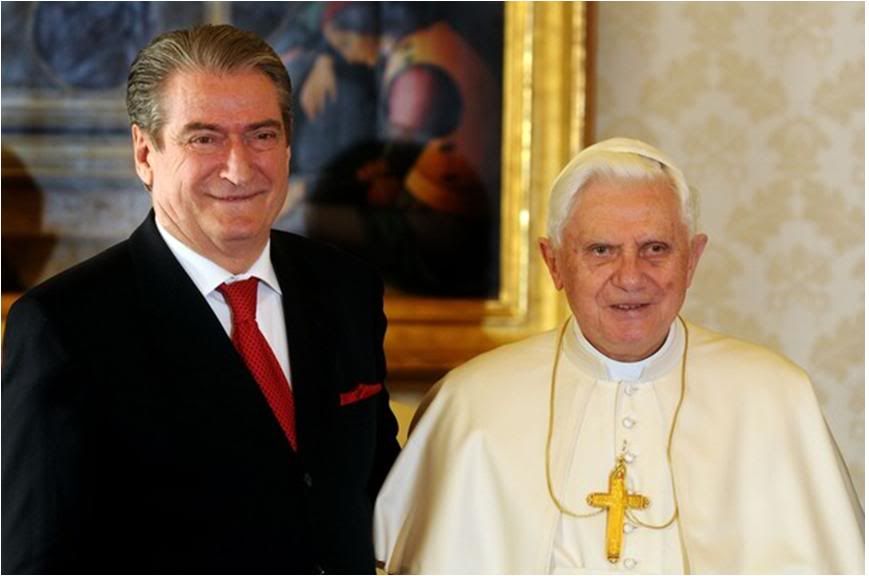
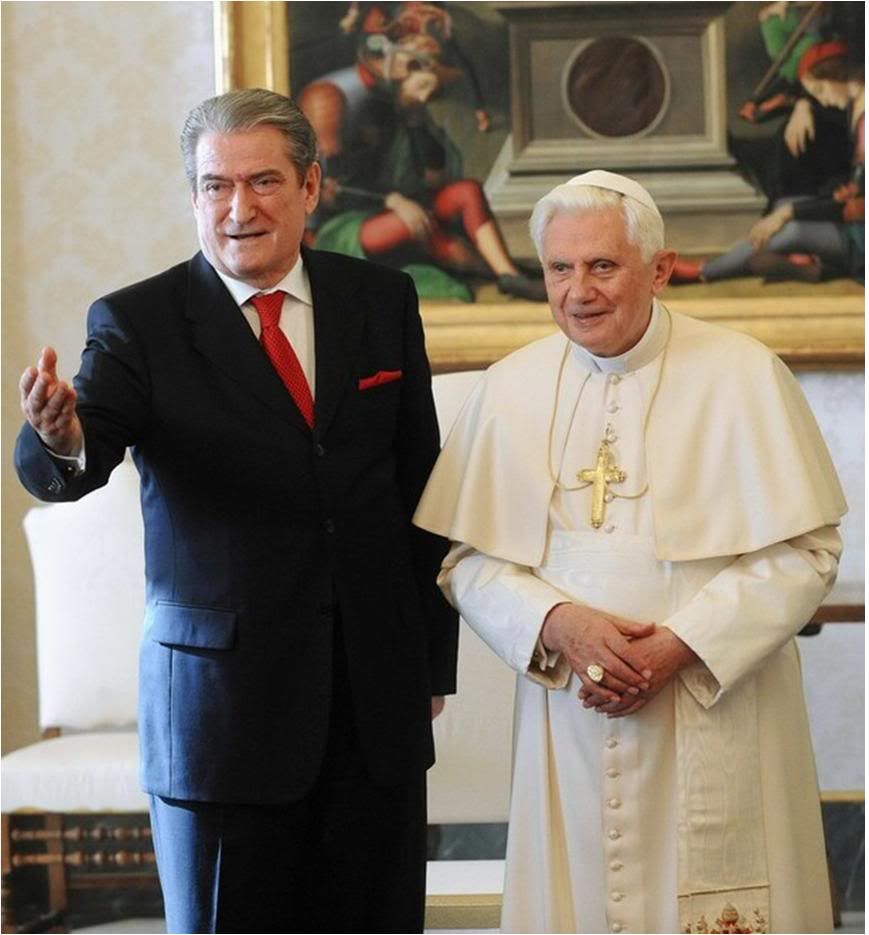
COMMUNIQUE
 This morning, the Prime Minister of the Republic of Albania , Mr. Sali Berisha was received by Pope Benedict XVI and, subsequently, met with the Secretary of State, Cardinal Tarcisio Bertone, who was accompanied by the Secretary for Relations with States, Archbishop Dominique Mamberti.
This morning, the Prime Minister of the Republic of Albania , Mr. Sali Berisha was received by Pope Benedict XVI and, subsequently, met with the Secretary of State, Cardinal Tarcisio Bertone, who was accompanied by the Secretary for Relations with States, Archbishop Dominique Mamberti.
During the cordial talks, there was an exchange of views on various topics concerning the current international situation, with particular reference to the Western Balkan region.
In addition, they reviewed various aspects of bilateral relations, sharing positive views of their development. Mention was also made of traditional family values, which are the common heritage of the Albanian people.
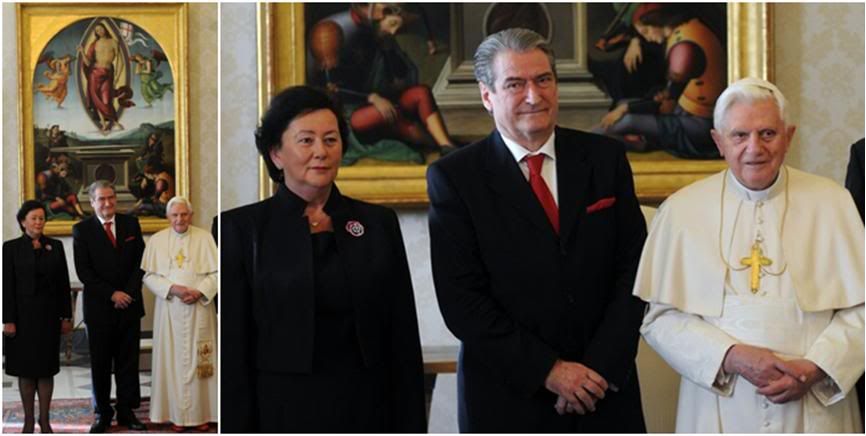
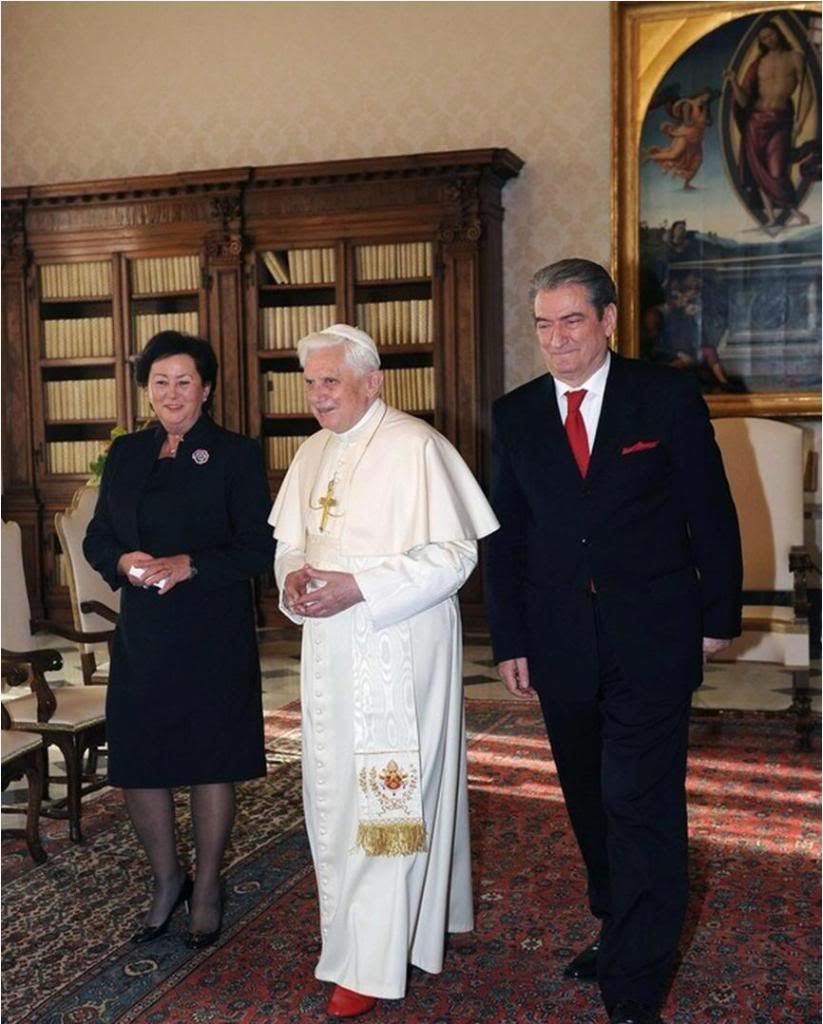 What was not in the communique:
Pope invited to Albania
What was not in the communique:
Pope invited to Albania
for Mother Teresa's
100th birth anniversary

VATICAN CITY, Dec. 12 (Translated from Apcom) - The Prime Minister of Albania, Sali Berisha, invited Pope Benedict XVI to visit Albania next year for the 100th anniversary of Mother Teresa's birth.
The Blessed nun, who is known as Teresa of Calcutta, was born from Albanian parents in Skopje, part of then Yugoslavia, but spent much of her missionary life and remarkable apostolate in India.
Berisha was accompanied by his wife Liri.
[What Apcom does not point out is that the Pope's foreign itinerary for 2010 appears to have been firmed up by now, to include Malta in April, Portugal in May, Cyprus in June, and the United Kingdom in September.
Mother Teresa's birthday falls on August 28, and of course, since Albania is just across the Adriatic from Italy, the possiblity cannot be ruled out.]
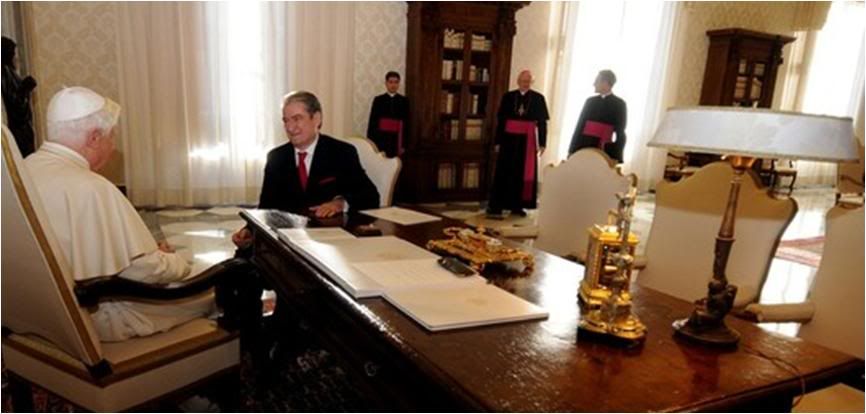
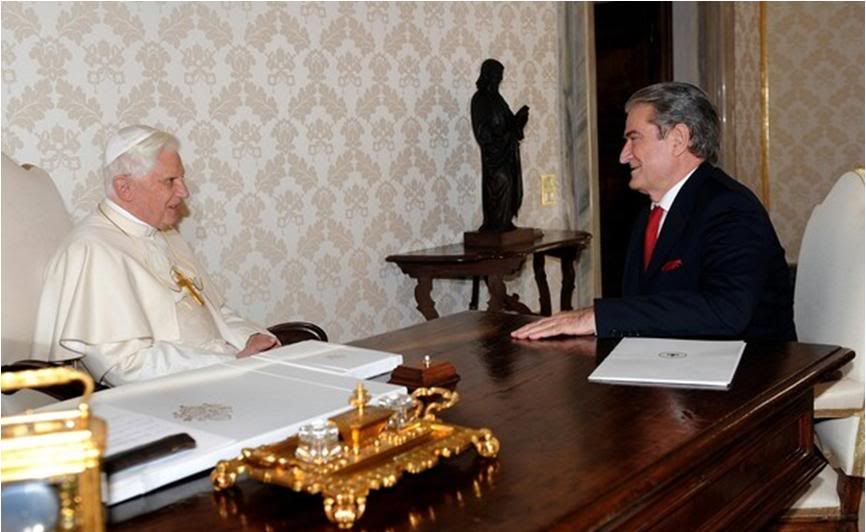
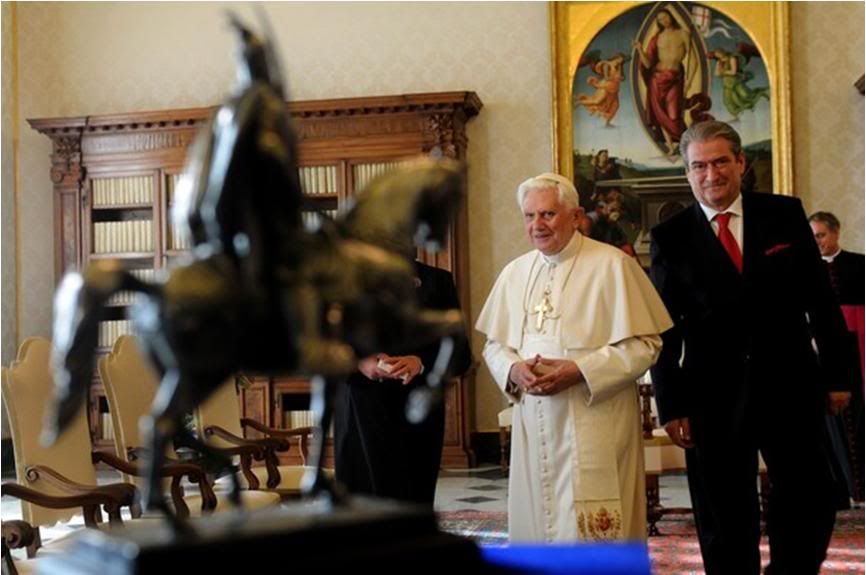
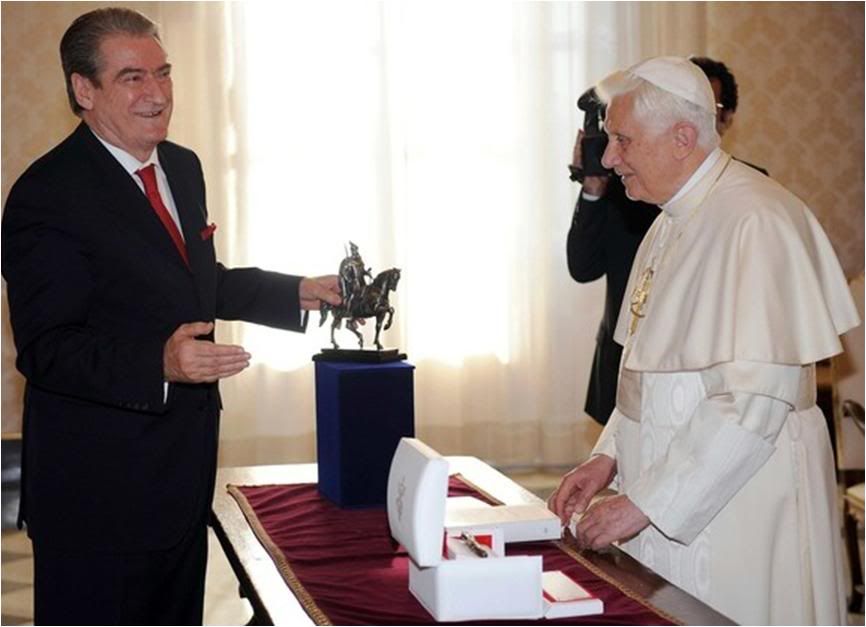
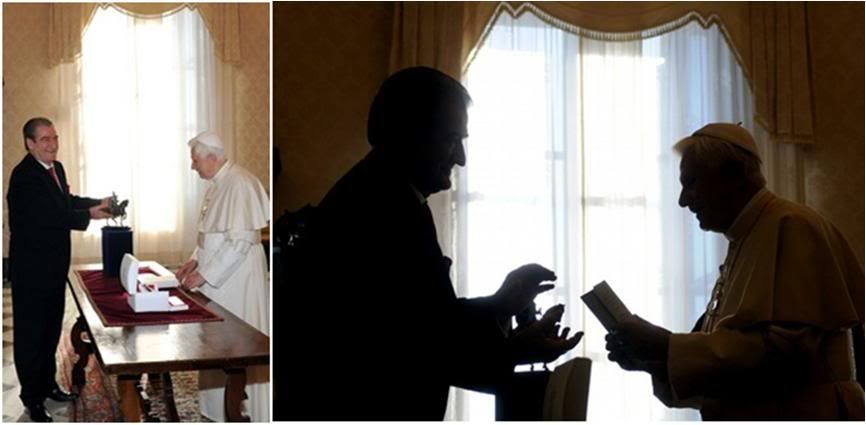
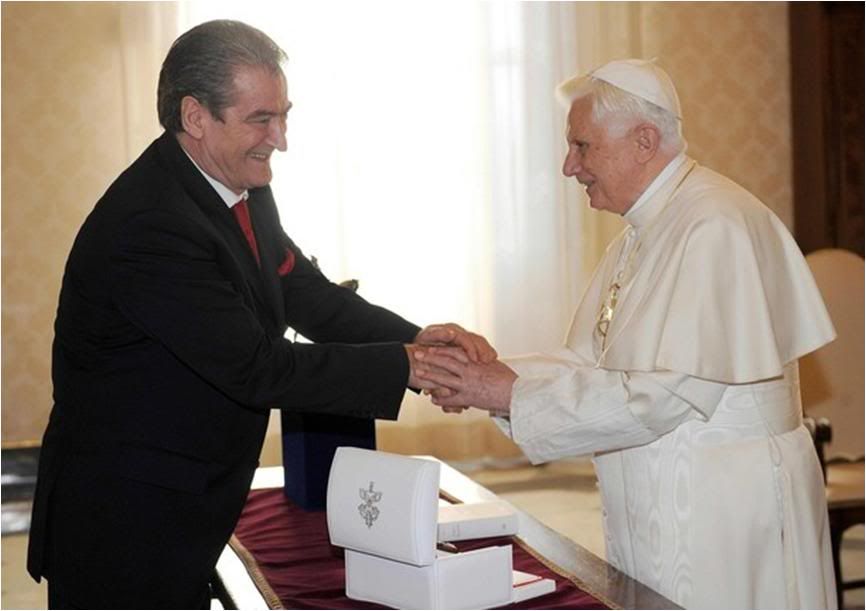
[Modificato da TERESA BENEDETTA 13/12/2009 03:23] |
| |
 13/12/2009 12:20 13/12/2009 12:20 |
|
| | | OFFLINE | | Post: 19.069
Post: 1.716 | Registrato il: 28/08/2005
Registrato il: 20/01/2009 | Administratore | Utente Veteran | |
|

 Another enterprise story from ASCA!
Moscow anxious to sign accord
Another enterprise story from ASCA!
Moscow anxious to sign accord
with Rome similar to
the Manhattan Declaration

ROME, Dec. 12 (Translated from ASCA) - The Orthodox Patriarchate of Moscow is 'ready' to sign with the Catholic Church a common statement "for the defense of the Christian tradition" - from the defense of life from conception to natural death, to full support of teh traditional family, from the promotion of the presence of religion in the public sphere, to safeguarding Christian values in Europe - similar to the contents and intentions of the Manhattan Declaration signed by Catholics, Orthodox and Protestant leaders in the United States last month to oppose "unjust laws' by the State.
This was affirmed to ASCA by the #2 official in the Department of External Ecclesial Relations of the Moscow Patriarchate. Hieromonk Philipp Ryabykh. [His chief is Archbishop Hilarion, in effect, the patriarchate's foreign minister, in the job that Patriarch Kirill held for years before he was elected to succeed the late Alexei II earlier this year.]
While Ryabykh underscored the 'ever growing' accord between the Catholic Church and the Russian orthodox Church, he also reiterated the Russian view that it is "too soon' to speak of a meeting between the Patriarch of Moscow and Pope Benedict XVI.
"We appreciate the meeting that the Pope had with President Medvedev, but problems persist with the Greek Catholic Church in the Ukraine which continues to seek expansion and to proselytize among the Orthodox."
He said the meeting between the two Church leaders could only take place after such problems are resolved, "and this is still very difficult".
The possiblity of such a meeting, he said, "is on the agenda, but it is not fixed nor in preparation".
Meanwhile, Ryabykh said that the Patriarchate is 'anxious' to sign a common agreement with the Catholic Church in defense of Christian tradition "since both Churches are ready" for it.
He said that the occasion for launching such a common agreement could be "the plenary assembly, which takes place Feb. 1 in Moscow, of the Inter-Christian Consultative Committee of the nations of the former Soviet Union and of Eastern Europe".
"This is an ecumenical pan-Christian council," he pointed out. "In such a context, we hope to be able to present a declaration in defense of Christian tradition similar to the Manhattan Declaration".
The "defense of Christian values and tradition" and the battle against secularism are issues on which the Vatican and Moscow have shown great convergence for some time.
The Catholic and Orthodox Churches will start a common dialog with European institutions in implementation of Art. 17 of the Treaty of Lisbon [which governs the supranational administration of the European Union] that went into effect earlier this month.
But that collaboration could go farther: the Manhattan Declaration, launched in the midst of the Christian battle plan against federal funding for abortion that may yet be part of the sweeping health care reforms pushed by President Obama, aims at what it calls 'unjust laws'.
"We will not agree," it says, " to any edict that will oblige us or any institutions we lead to carry out or agree to abortions, embryonic research, assisted suicides, euthanasia or any other act that violates the principle of the profound, intrinsic and equal dignity of every member of the human family."
"Moreover, let it be known that we will not be reduced to silence or acquiescence or the violation of our consciences by any power on earth, whether cultural or political, independent of the consequences to ourselves".
Ryabykh explained the reason for the letter recently sent by Archbishop Hilarion to the president of the German Lutheran Church, Margot Kassman. Hilarion announced the 'impossibility' on the part of the Orthodox, to continue the dialog between their two churches 'in the same form', after her election as the first woman president of Germany's evangelical Christians, and in the light of divergences in the ethical field "that have been aggravated dramatically".
The letter has led the German Lutherans, in response, to cancel the celebration of the 50th anniversary of the start of theological dialog between the two churches.
For Ryabykh, this decision is the inevitable consequence of the 'decline' of ecumenism as it has been practised in recent decades: "For decades, attempts by Christians to reach a common theological position have failed, and today, even on ethical issues, there are tensions and disagreements which were not there before".
"The new divisions are on issues like abortion, euthanasia and gay marriages," he said, "which clearly do not allow all Christians to work together".
That is why, he said, an initiative like the Manhattan Declaration, agreed to by Catholics, Orthodox and Protestants, is 'a good sign' in a world where there is no structure of dialog among the three main branches of the Christian tradition "with the specific aim of defending the Christian tradition in the modern world and in various societies at the international level".
[Modificato da TERESA BENEDETTA 15/12/2009 01:03] |
| |
|
|
|
|